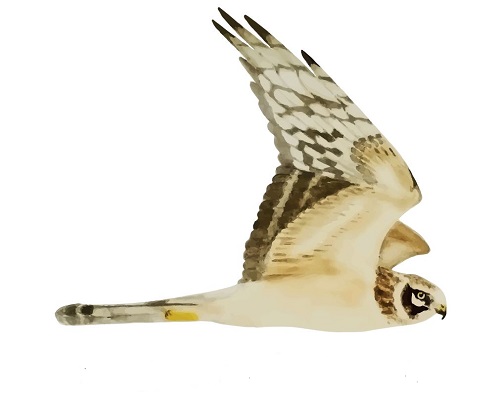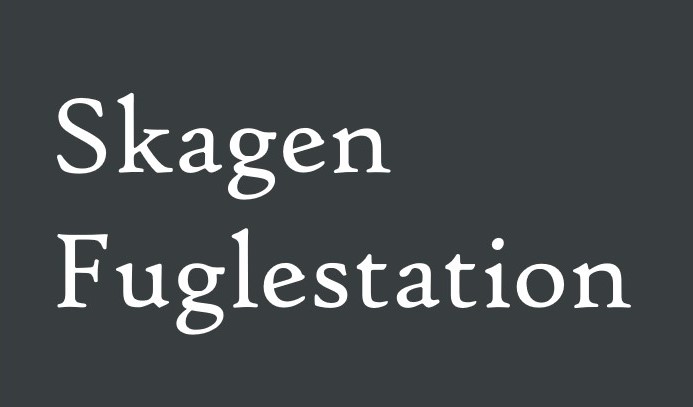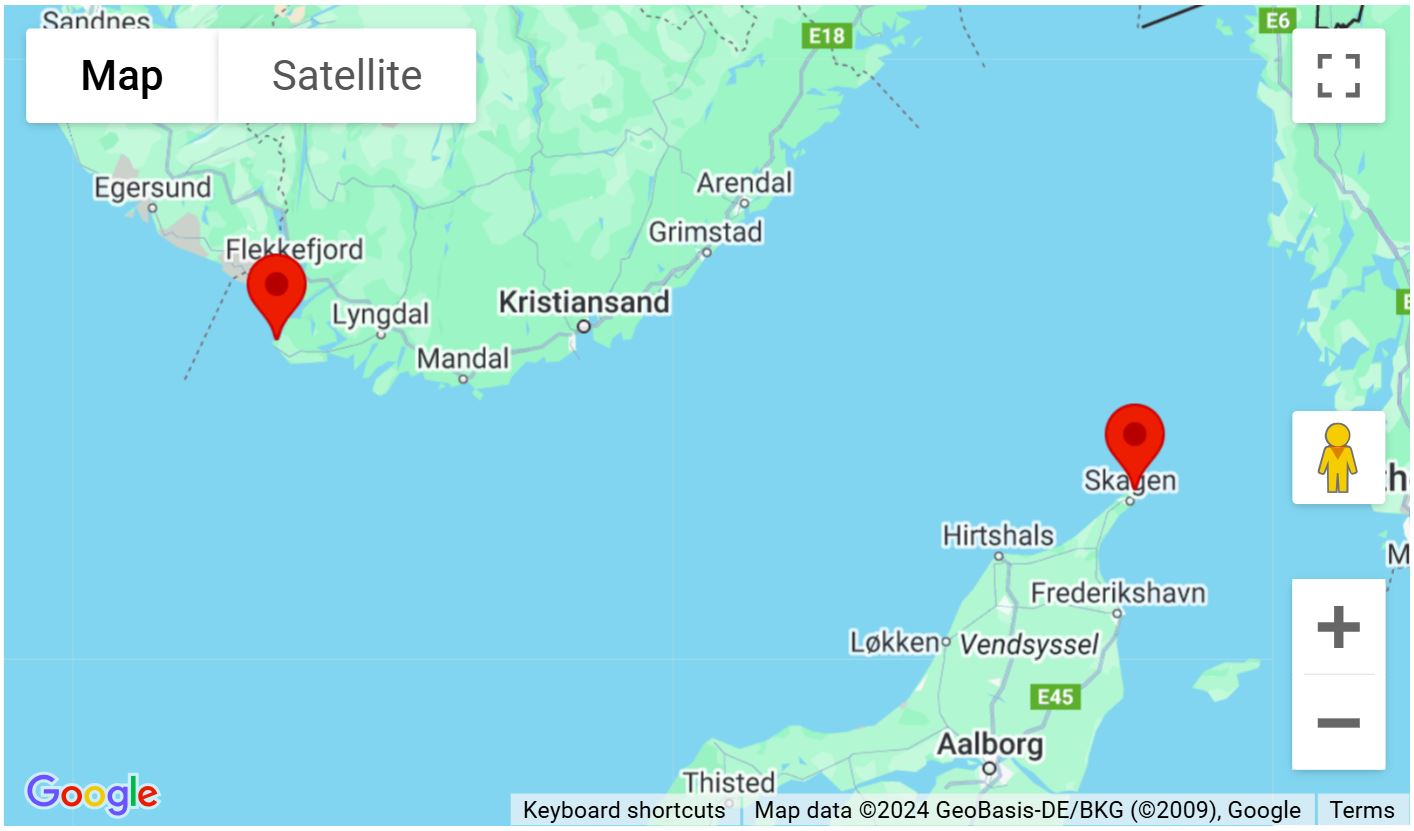Her på Skagen Fuglestations blog bringes korte nyheder i dagbogsformat om hændelser på fuglestationen.
Se indlæg fra måned: feb. (16)mar. (30)apr. (30)maj (31)juni (30)juli (31)aug. (31)sept. (30)okt. (31)nov. (29)dec. (11)
Foggy days

Panorama of Kabeltromlen this morning
Today Ragnar and Emma went out to Worlds End 3 for morning observations, they had a couple of cool observations! They saw a Great Northern Diver (Islom) in Summer plumage close to shore, that’s not something you see everyday here. Later they also found a Red-footed Falcon (Aftenfalk) which few close to Kabeltromlen, where me and Rosa were ringing today, so we also got a good view of a young Red-footed Falcon. We had an otherwise beautiful morning in the ringing with the fog over the reedbeds around us. Unfortunately not to man birds found their ways in to our nets today, the highlight was probably a first Year Water Rail (Vandrikse).
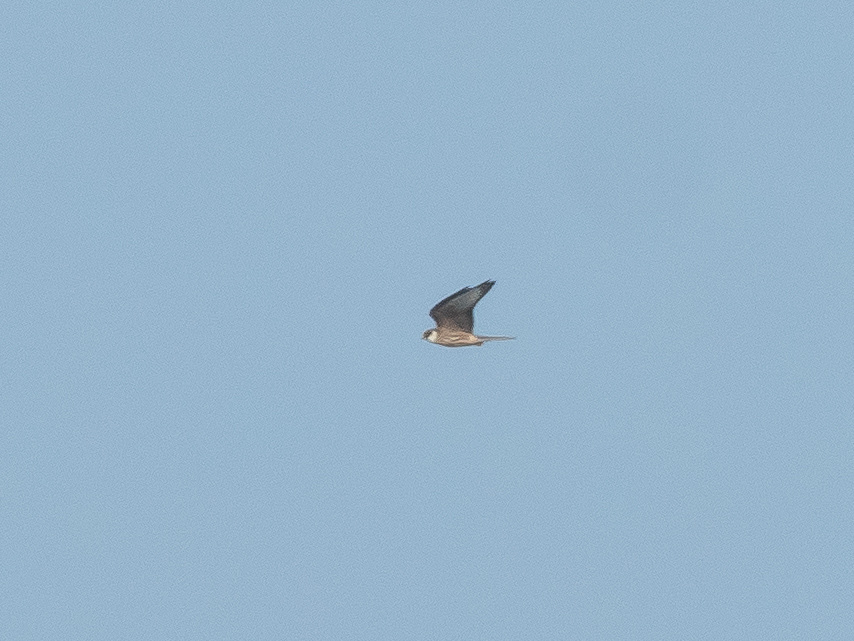
Red-footed Falcon/ Aftenfalk from this morning
In the afternoon I went on a walk with Emma to Grenen to find the Crested Larks, wich decided to stay hidden from us today. Rosa also went on a walk and found around thirty Goldcrests (Fuglekonge) in Elle Kratttet. In the afternoon Ragnar and Simon gave a guided tour to the staff of 'FF Skagen', they had a little competition on who could find the most birds on their tours, Ragnars Team won, so congratulations to them!
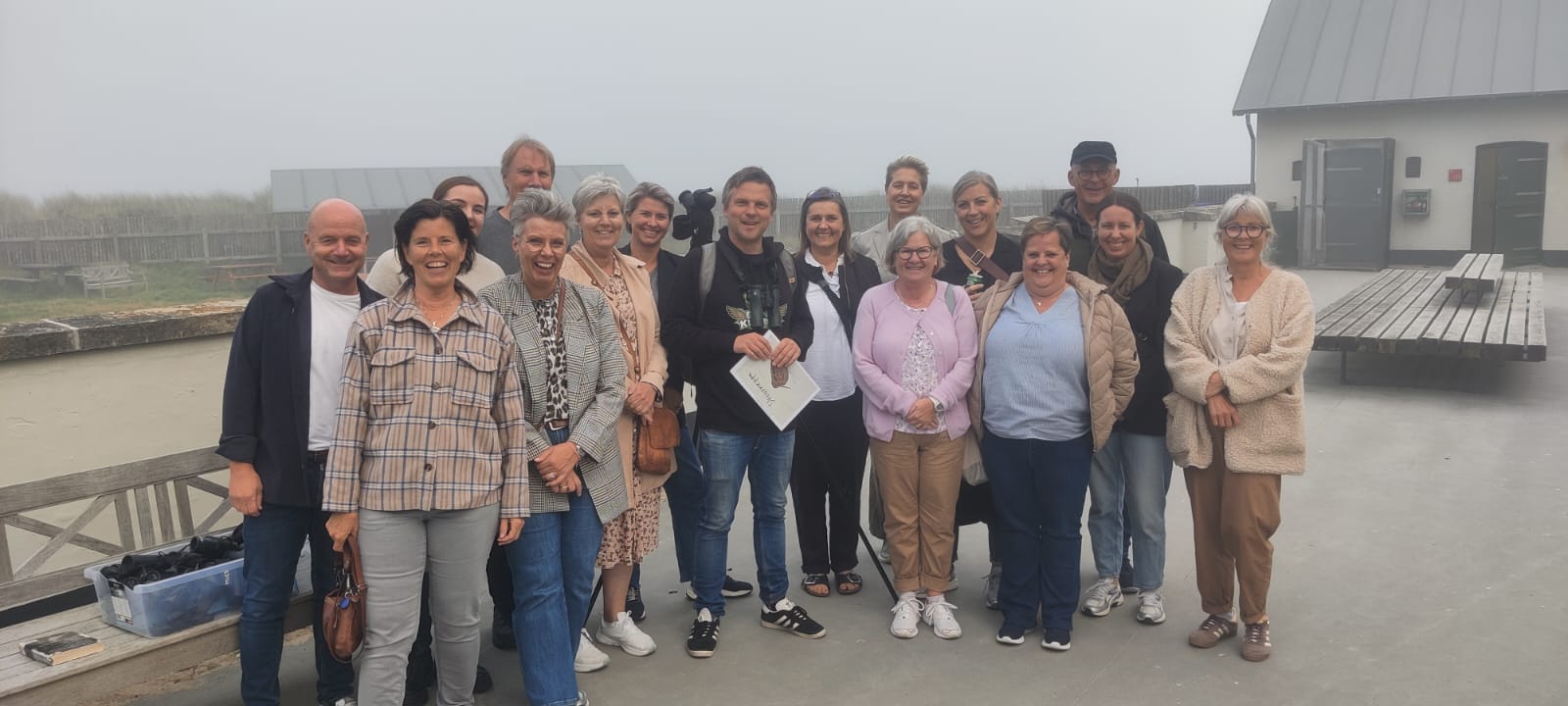
The participants of the guided tour for the staff of 'FF Skagen', and Simon S. Christiansen
Today we also go a mail regarding the Red Knott (Islandsk Ryle) with the Norwegian Metal (!) ring which I was able to read on the Fulmar Suryey walk on the 6th of September with Mara, read the blog from that day here. The Red Knott (Islandsk Ryle) was orn this year and go ringed near Farsund in Norway on the 29th of September. So this individual traveld 241km in 8 days!
Map of the Red Knot with ringing site in Norway and 'recapture' in Skagen
Higlights from the observations:
Great Northern Diver/Islom - 1, scarce visitor
Red- footed Falcon/Aftenfalk - 1, scarce visitor
Ringing (Kabeltromlen):
Gærdesmutte - 1
Rødhals - 5
Munk - 7
Fuglekonge - 2
Gransanger - 5
Jernspurv - 3
Total = 23
Link to today's observations from observers in the area
People at the station: Ragnar Smith, Rosa Hicks, Augustin Sticksel, Mara Glane, Emma Fabre, Simon S. Christiansen.
Little Snow Buntings, a Pipit and lectures
Hej!
Another day of sun and nice birds. The day started with Ragnar, Emma and Augustin going to the observation point, while Rosa and I had already finished opening all the nets. A little soaked from the wet vegetation and countless of spiderwebs we brushed through, we waited for the first birds under the glow of the full moon. The early hours brought many Robins/Rødhals, Chiffchaffs/Gransanger and Reed Buntings/Rørspurv. After the numbers slowed down, we caught another Jay/Skovskade. This one wasn’t as snappy as the last one a few days ago, and so an even nicer birds to ring.
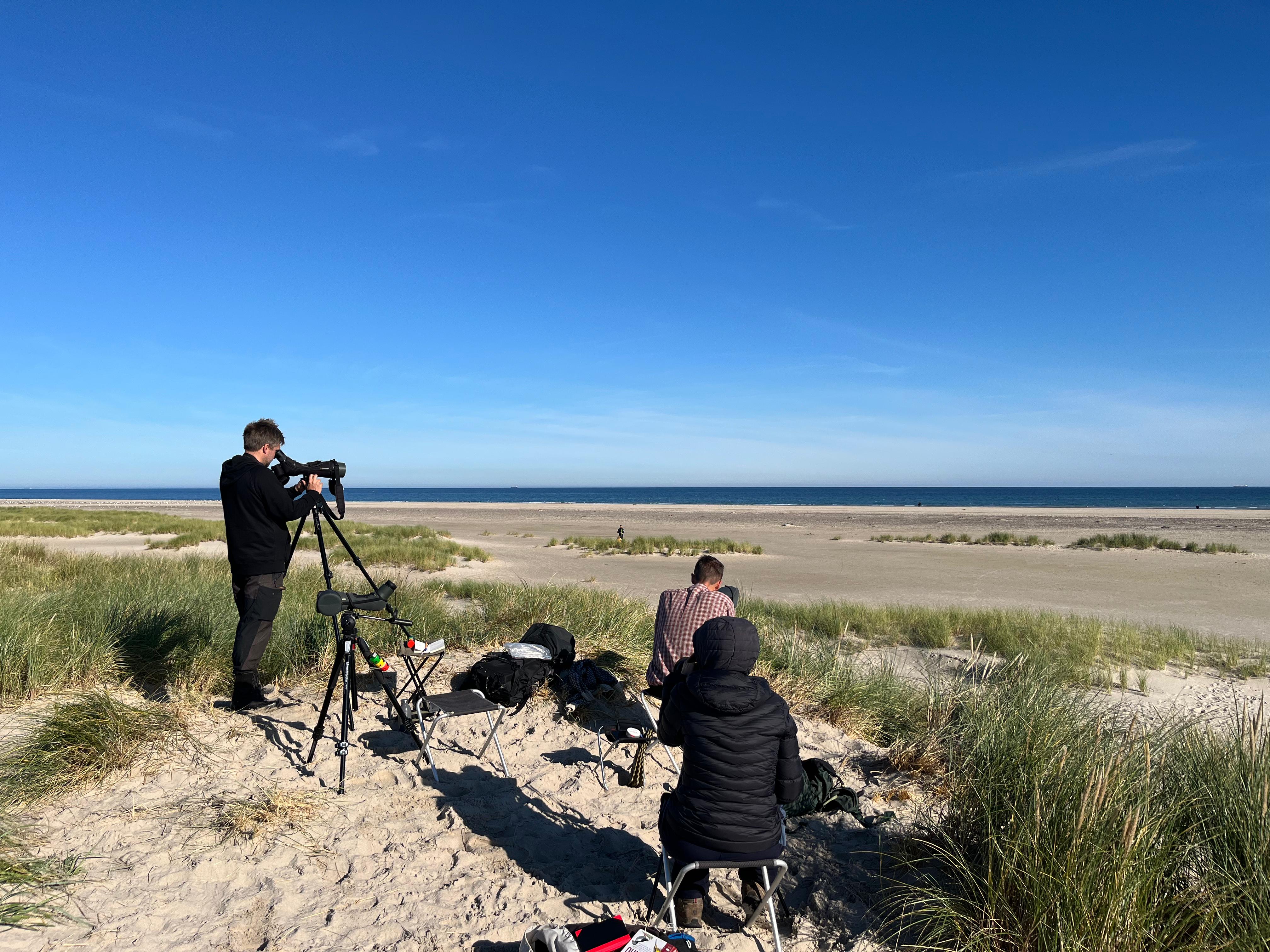
At the observation at World's End 3
Over at the observation point, Ragnar spotted a Little Bunting/Dværgværling flying over – the first one of the autumn, and hopefully not the last. He also heard a Red-throated Pipit/Rødstrubet Piber, which, luckily, was recorded on our all-time recording recorders. Listen to it here.
Rosa was so kind and close all the nets on her own, giving me the chance to go for a walk, and I finally saw my first Snow Bunting/Snespurv, sitting in the sand amongst all the tourists heading to the tip of Denmark. So very cute! At 2 pm, we all gathered at the station for a little talk by Simon on identifying the Phylloscopus warblers. Naturally, Ragnar, with his years of experience, won the Kahoot quiz at the end. Now, we all feel prepared for any rare warblers or first-time records for Denmark that come our way to Skagen!
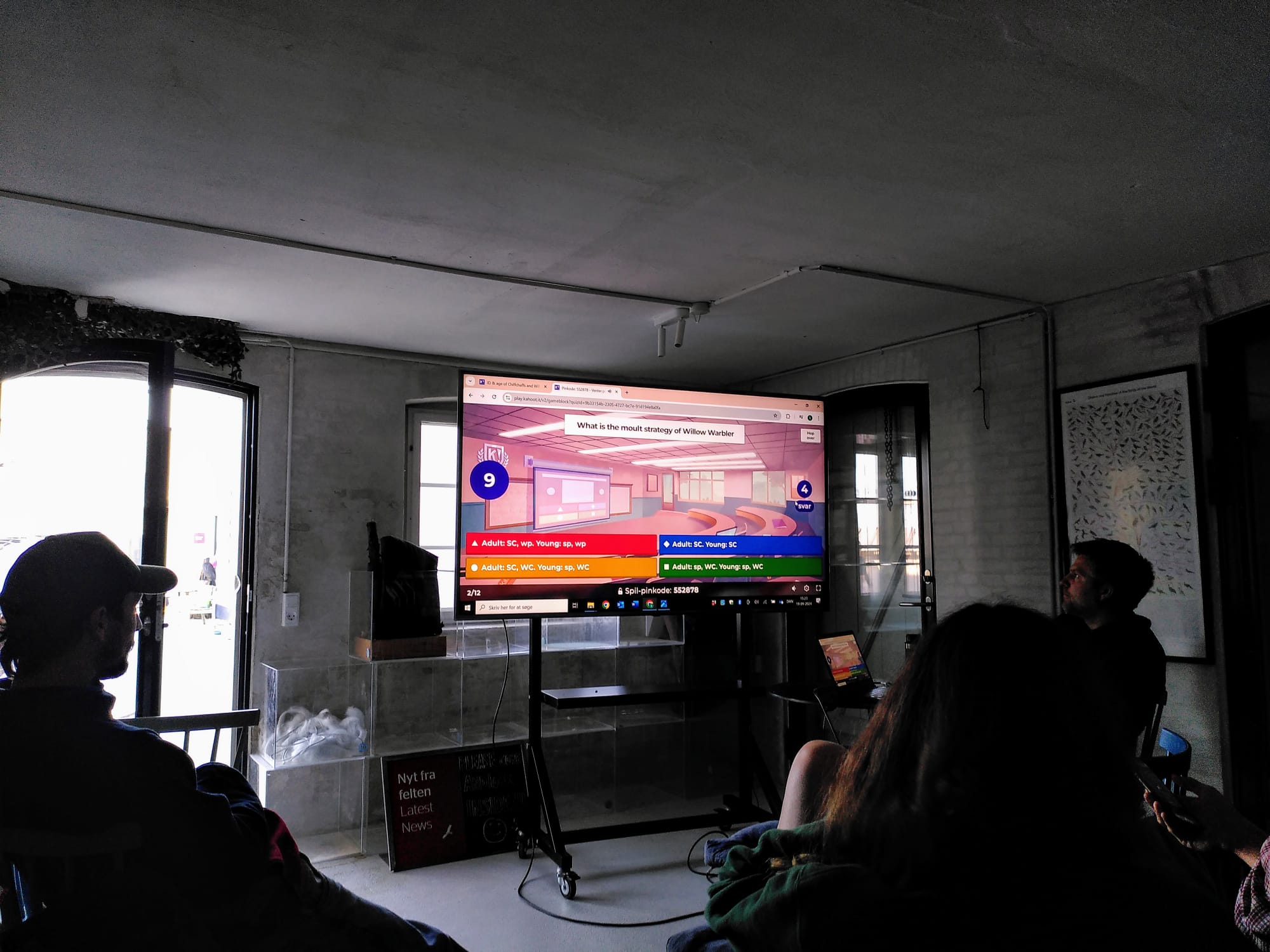
Simon challeging us with a Kahoot quiz after his talk
After the presentation, everyone went off on their own little adventures around the lighthouse to enjoy the sun and birds. Both Ragnar and Augustin spotted the same two Crested Larks/Toplærke independently. Dinner then motivated Rosa and Ragnar to now head out for night catching, aiming to capture one of them. Good luck! Meanwhile Peter Østrin gave his talk about his interesting encounters with whales and orcas once more, this time in danish for others to enjoy!
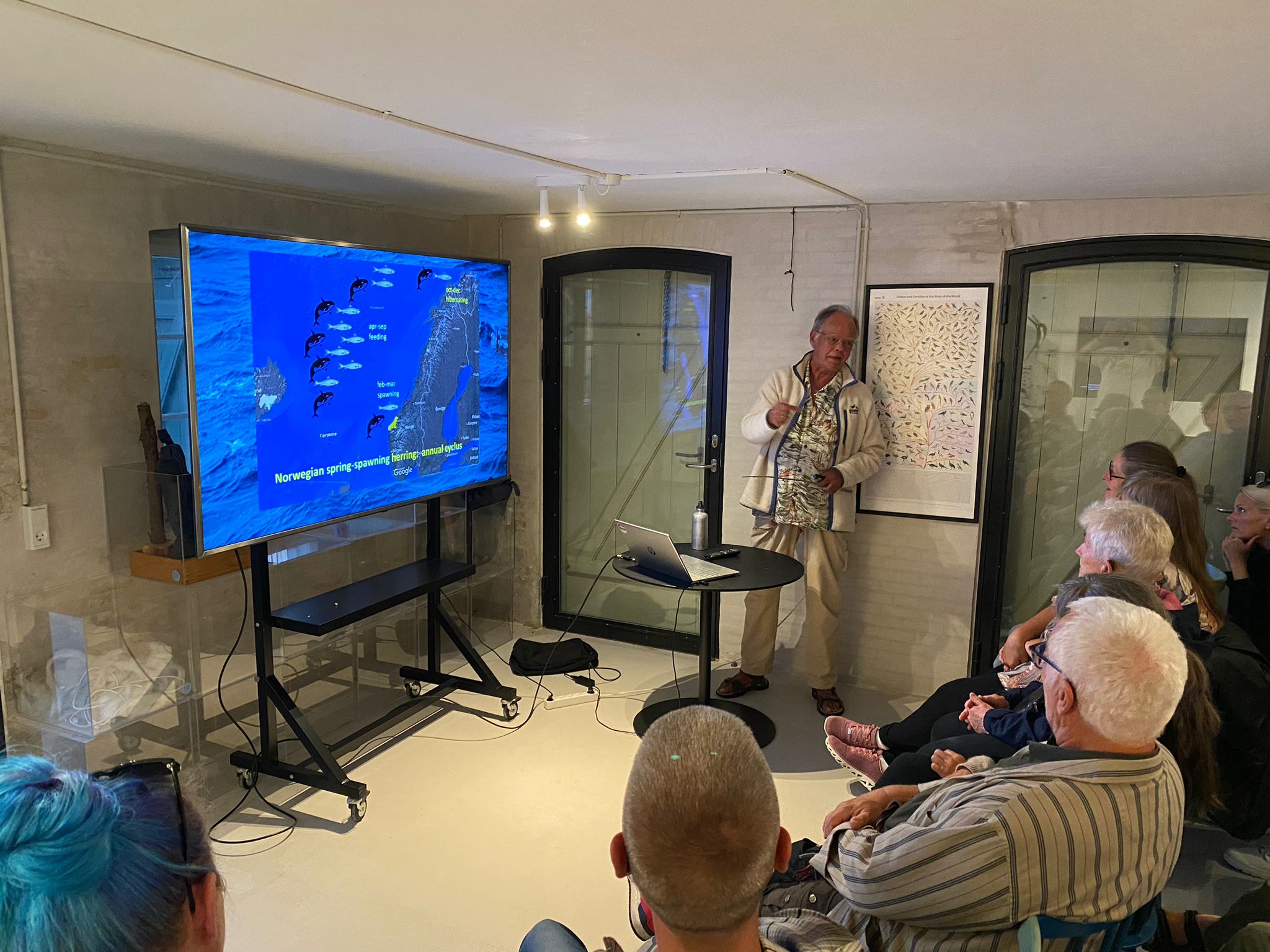
Peter Østrin and his listeners on tonights presentation
Higlights from the observations:
Little Bunting - Dværgværling: 1 roosting, 41st record for Skagen, first this autumn
Red-throated Pipit - Rødstrubet Piber: 1 migrating, scarce almost annual autumn visitor.
Mediterranean Gull - Sorthovedet Måge: 3 roosting
Caspian Gull - Kaspisk Måge: 2 roosting
Great Northern Diver/Yellow-billed Diver - Islom/Hvidnæbbet Lom: 1 migr. SE, either one of those two species, but too far for identification
Ringing (Kabeltromlen):
Skovskade - 1
Solsort - 1
Musvit - 1
Gærdesmutte - 3
Rødhals - 5
Rørsanger - 3
Munk - 4
Rørspurv - 4
Blåmejse - 1
Fuglekonge - 1
Gransanger - 5
Total = 29
Link to today's observations from observers in the area
People at the station: Ragnar Smith, Rosa Hicks, Augustin Sticksel, Mara Glane, Emma Fabre, Simon S. Christiansen, Peter Østrin, Jayne Østrin
Ducks, Skuas and Orcas
With a weather forecast almost identical to the one yesterday, we knew what to expect. Rosa and Mara went to Kabeltromlen as per usual while me, Augustin and Emma went out to Worlds End 3. The sea was somewhat quiet, but we got some good looks at migrating Black-throated Divers (Sortstrubet Lom), Mediterranean Gulls (Sorthovedet Måge) and Little Gulls (Dværgmåge). Again today we also had some good migration of passerines with highlights being Grey Wagtail (Bjergvipstjert) and this autumn seasons first siskins (Grønsisken). Far away a perching Goshawk (Duehøg) 1k caused some initial headaches, but the migrain of the day was when Augustin, while covering the inland migration, called out “Pochard!”. I immediately swung the scope in the general direction he was looking and I simply couldn't find the bird. While I was looking he started saying strange stuff like “It looks like a Red-crested Pochard (Rødhovedet And)” and right before it went below the bushes above the Cormorant Lake I saw a dark duck with seemingly pale/whiteish wings. Red-crested Pochard is more rare than Black-browed Albatros (Sortbrynet Albatros), with only one record ever in Skagen. After some quick deliberation I jumped on the mountainbike and went to the track that leads to the Cormorant Lake and started walking. After some wet shoes and quick walking, I was finally at the lake, but no Red-crested Pochard. Instead a nice female-type Garganey (Atlingand) was swimming around! Not as rare as the pochard, still a really good bird in Skagen during the autumn, with three autumn records ever in Skagen, it was a nice consolation price.
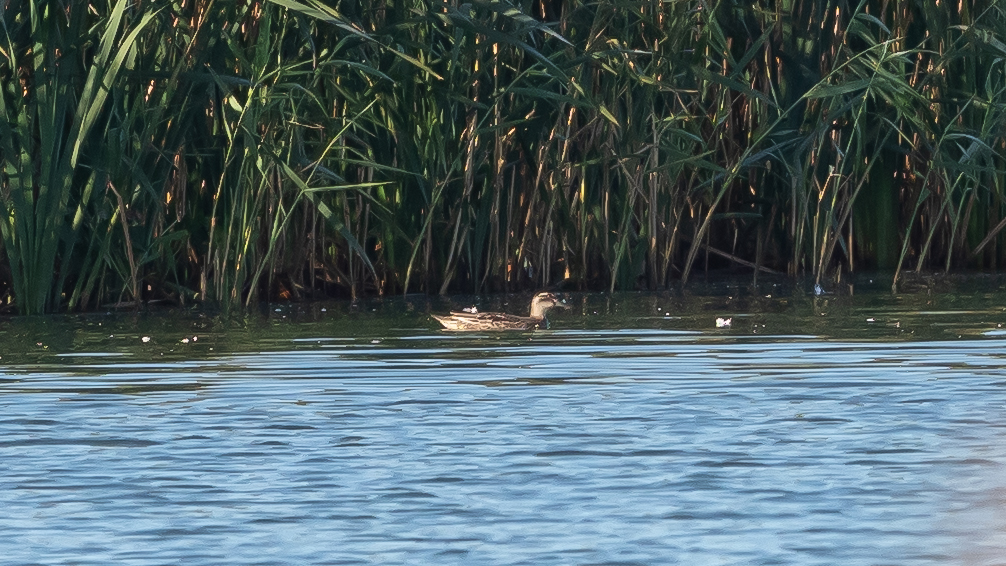 From a strictly local perspective, this is the bird of the day, but in broader sense, long-tailed got it beat.
From a strictly local perspective, this is the bird of the day, but in broader sense, long-tailed got it beat.
While looking for the pochard I received a call from Erik about a Long-tailed Skua (Lille Kjove) 1k roosting in reef out of the tip, so I called Augustin and told him that there was a Long-tailed Skua at the tip, but they had already seen it and videoed, nice! I started my long walk back, and out at the Simon was out with us looking for the Long-tailed Skua, but they hadn’t seen it for some time. Otherwise it was quiet, except the Snow Bunting (Snespurv) had returned and we could see from close range feeding until a Wheatear (Stenpikker) scared it away!
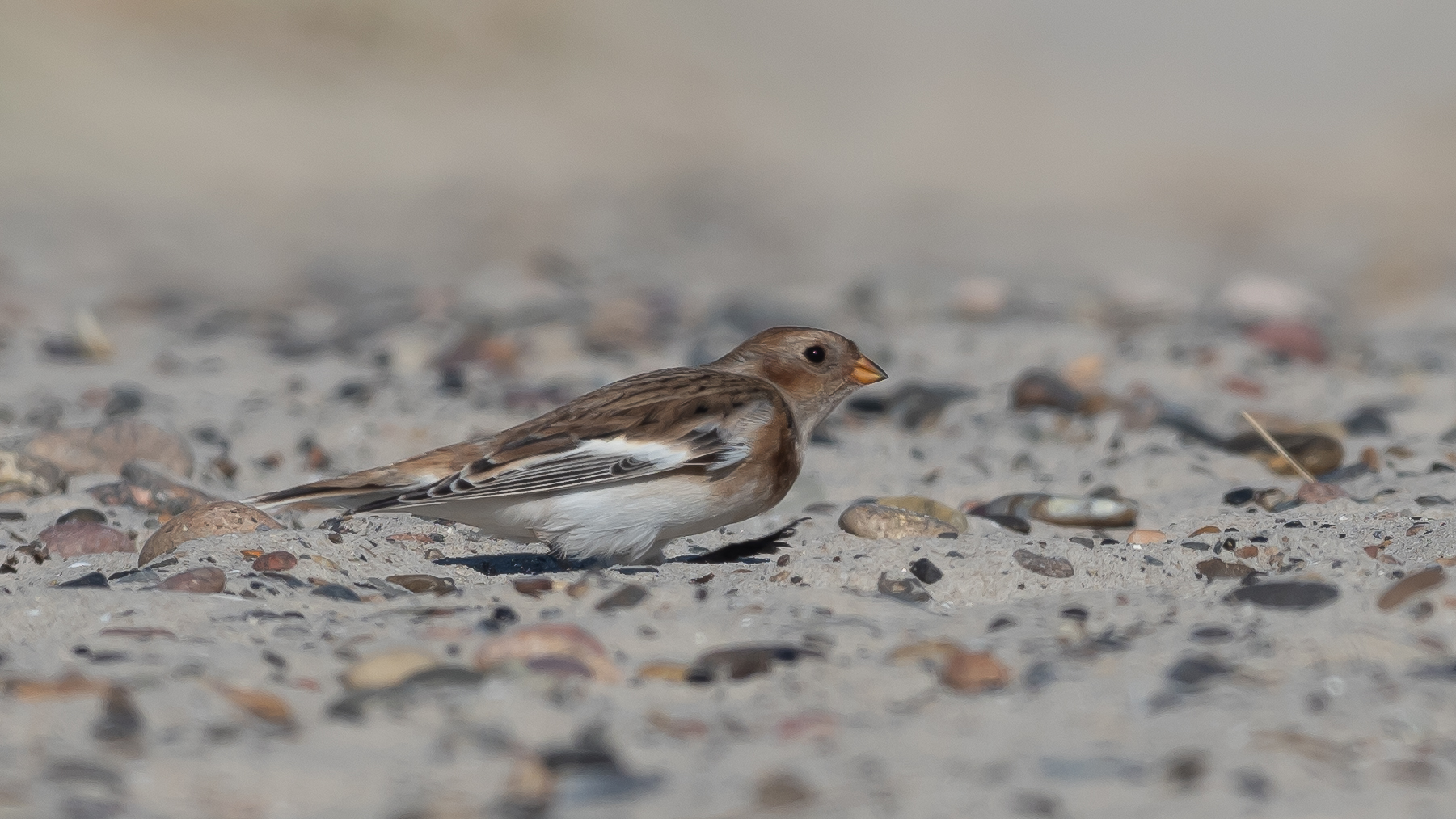 confiding small snowball, though this one is a bit early
confiding small snowball, though this one is a bit early
When the standardized period was over, Emma went back and Augustin went to the Cormorant Lake to look for the pochard, while I stayed back. It resulted in some of the best views of a Long-tailed Skua I have ever had. After two hours I went back to the station, cleaned up and went to the Skagen Art Museum to experience something other than birds. Sadly the birds followed me as I found a taxidermied Spectacled Eider (Brilleederfugl) female! Quite a surprising location to a taxidermied individual of a species that is otherwise restricted to the NE parts of far east Russia and NW most Alaska, combined with the fact that is a relatively small population makes we wonder where this specific individual is from…
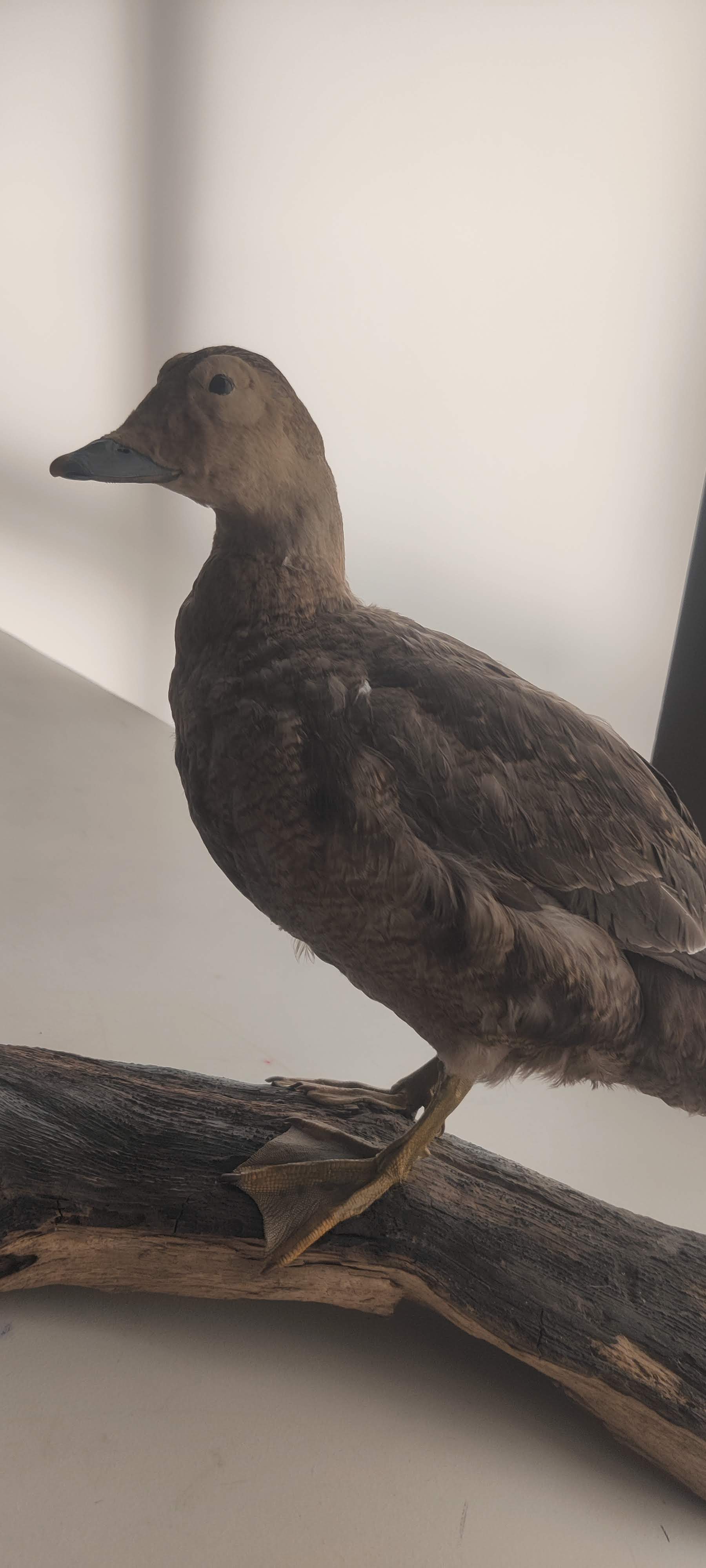 A live one would be quite the sensation, as there is only five records in the western palearctic, all of them from Northern Norway
A live one would be quite the sensation, as there is only five records in the western palearctic, all of them from Northern Norway
After watching art and eating ice cream I returned back to the station to have a half-way meeting with Simon about my stay at the station, as I have now been at SKAF for two months and three days. The others had also returned, Rosa had also been out for a walk and have had a meeting with Simon, Mara was out with her boyfriend and Augustin didn’t find the pochard. A quick evening meeting later we were down at the birders club to hear a special talk about the orcas (Spækhugger) in Skagerrak by Peter Østrin, a very interesting presentation with some very interesting data, thank you so much Peter! Now we are all heading back to bed after a long day.
Ringing (Kabeltromlen):
Gærdesmutte - Wren: 6
Rødhals - Robin: 14
Jernspurv - Dunnock: 2
Munk - Blackcap: 5
Rørspurv - Reed Bunting: 1
Gransanger - Chiffchaff: 5
Fuglekonge - Goldcrest: 2
Rørsanger - Reed Warbler: 2
Total: 37
Highlights from the observation:
Long-tailed Skua - Lille Kjove 1 1k light morph, very scarce migrant, third recorded by SKAF this autumn
Garganey - Atlingand 1 female-type, very rare autumn visitor, third autumn record ever
Mediterranean Gull - Sorthovedet Måge 2, still hanging around
Possible Red-crested Pochard - Rødhovedet And 1, second record for Skagen if refound
Goshawk - Duehøg 1k, scarce autumn visitor
Snow Bunting - Snespurv 1, still hanging around
Link to today's observations from observers in the area
People at the station: Ragnar Smith, Rosa Hicks, Augustin Sticksel, Mara Glane, Emma Fabre, Simon S. Christiansen, Erik Christophersen, Peter Østrin, Jean Østrin
My first day
On my first day at the station, I was happy to see a Snow bunting (Snespurv) and a many Common Eiders at the World’s End 3. They are rare in France. Otherwise, seebird migration was slow. But there are some interesting birds set on the beach like Kaspian Gull (Kaspisk Måge). Also some Meadow Pipit (Engpiber) flew over us, calling. For the ringers, there were more birds than yesterday, with many European Robin (Rødhals) and Eurasian Blackcap (Munk).
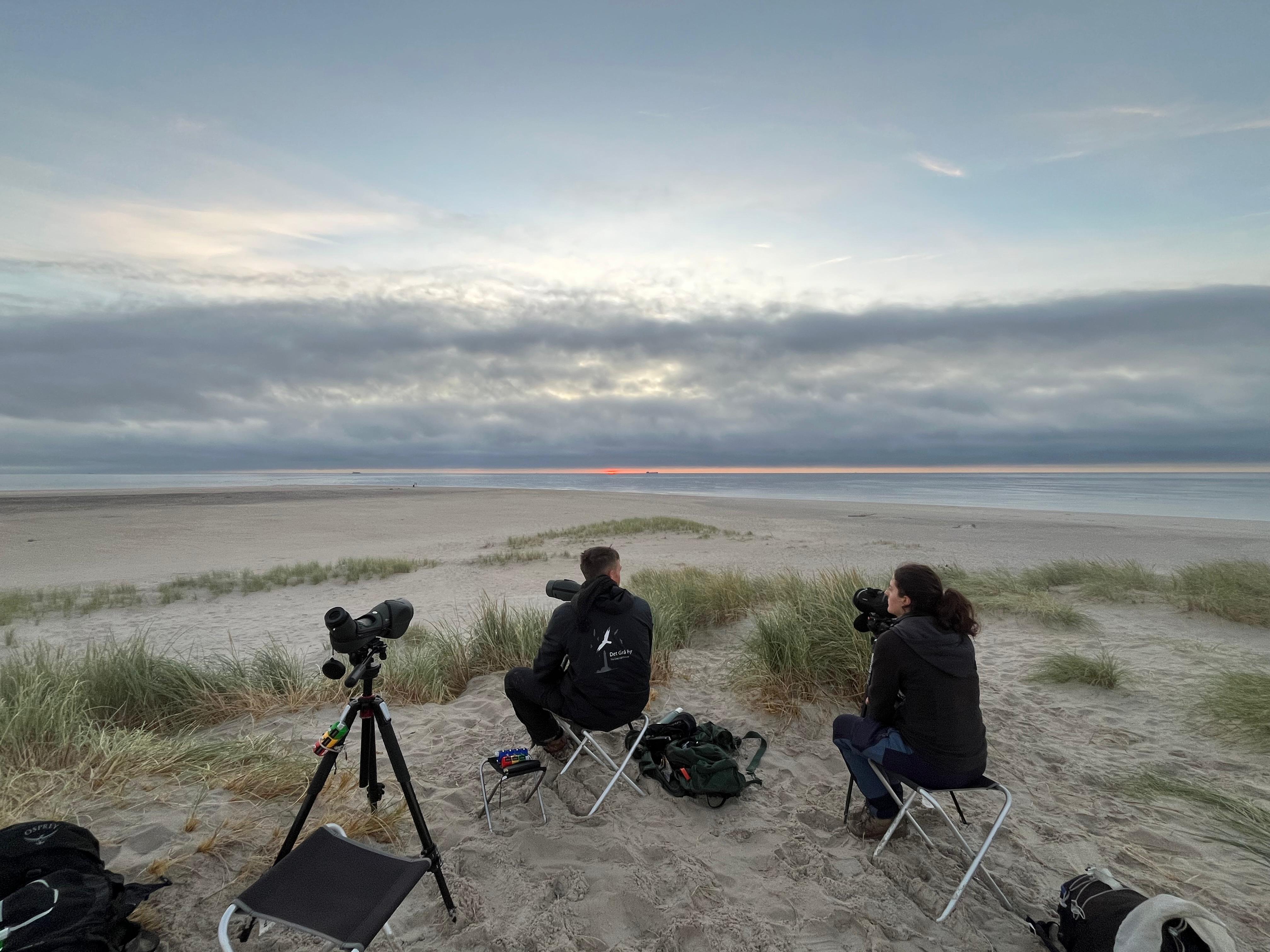
My first observation
In afternoon Ragnar went to a walk on the beach. Augustin, Rosa and me wanted some adventure, so we tried to find a way through into the stamp to reach the dunes. From the dunes, we spotted some nice birds like Horned Grebe (Nordisk Lappedykker) or Artic Skua (Almindelig Kjove). So Ragnar join us to see these birds.

Seewatching on the dunes
Highlights from the observations:
Kaspian Gull (Kaspisk Måge)
Little Gull (Dværgmåge)
Snow bunting (Snespurv)
Ringing (Kabeltromlen):
Vandrikse - 1
Rødhals - 12
Rørsanger - 2
Gærdesmutte - 2
Rødstjert - 1
Munk - 13
Gransanger - 5
Fuglekonge – 2
Total 38
Link to today's observations from observers in the area
People at the station: Ragnar Smith, Rosa Hicks, Augustin Sticksel, Mara Glane, Knud Peterson, Emma Fabre, Simon S. Christiansen, Jørgen Kabel og Erik Christphersen.
A Rose (Starling) in amongst the (Seabuck) Thorns
We started the morning full of pep for the week ahead. As the sun rose, the nets were opened, and the scopes were raised to the skies.
The ringing started with a Water Rail (Vandrikse), several Wrens (Gærdesmutte), and a few Chiffchaffs (Gransanger). While we were busy looking for moult limits within the feathers to age the chiffchaffs, we received a very exciting message – “Rosenstær ved Sandormen sti.” Just as Mara and I had figured that this might be a Rosy Starling (Rosenstær), with our Duolingo-limited Danish, Ragnar called to confirm this, much to our excitement. Having finished processing the birds and with a bit of time to spare between net rounds we took our waders on a rare excursion from Kabeltromlen and managed to spot the beautiful bird in the flock – success!
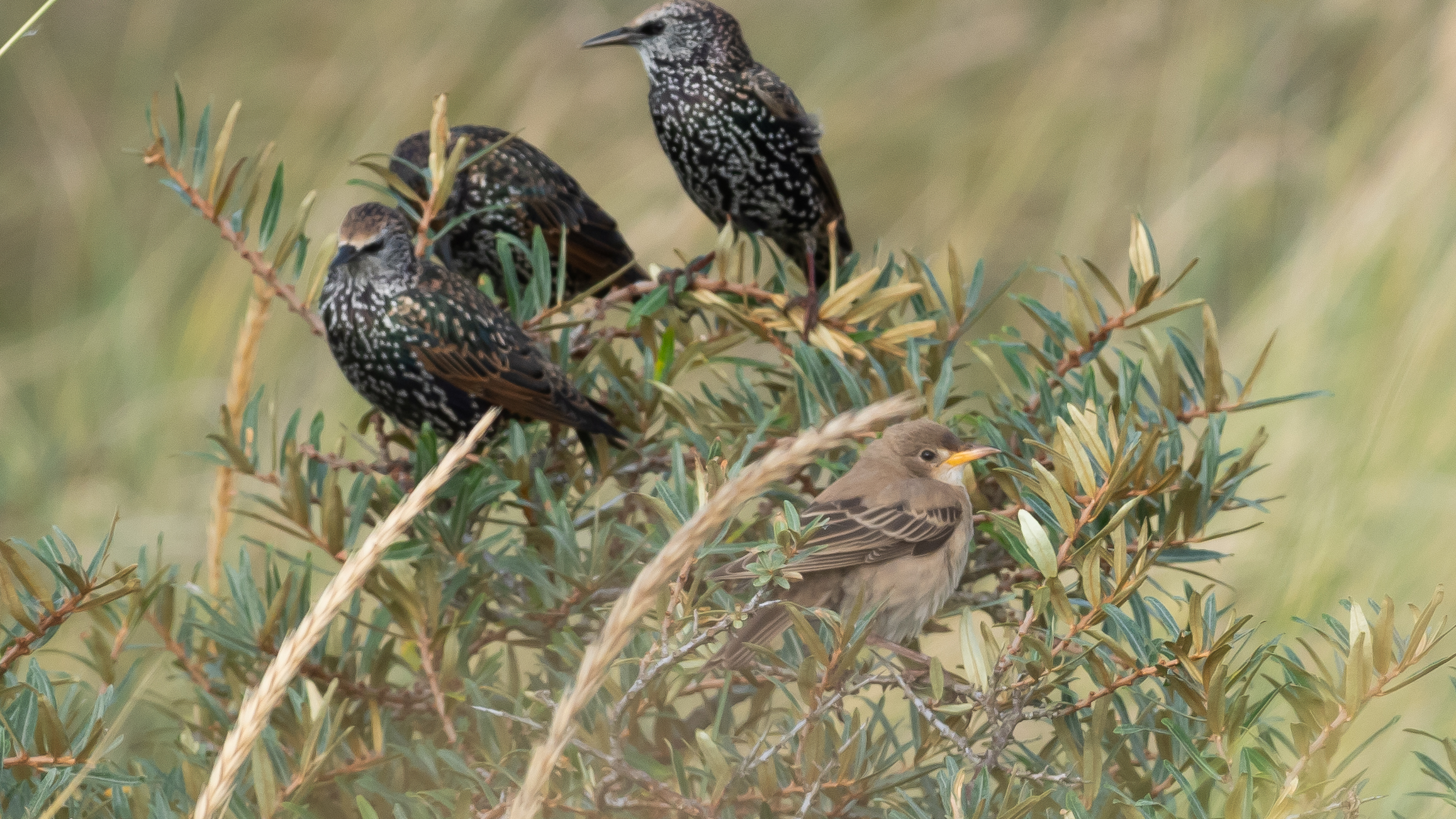
The young Rose-Coloured Starling (Rosenstær), photographed by Ragnar.
The remaining ringing was steady, with 21 new birds processed. The highlight was a Jay (Skovskade), a new species for both Mara and me. It was super cool to see the blue of the covert feathers, but just as cool to see the blue tones elsewhere that you can’t see in the field – on the tail, the forehead, and the iris!
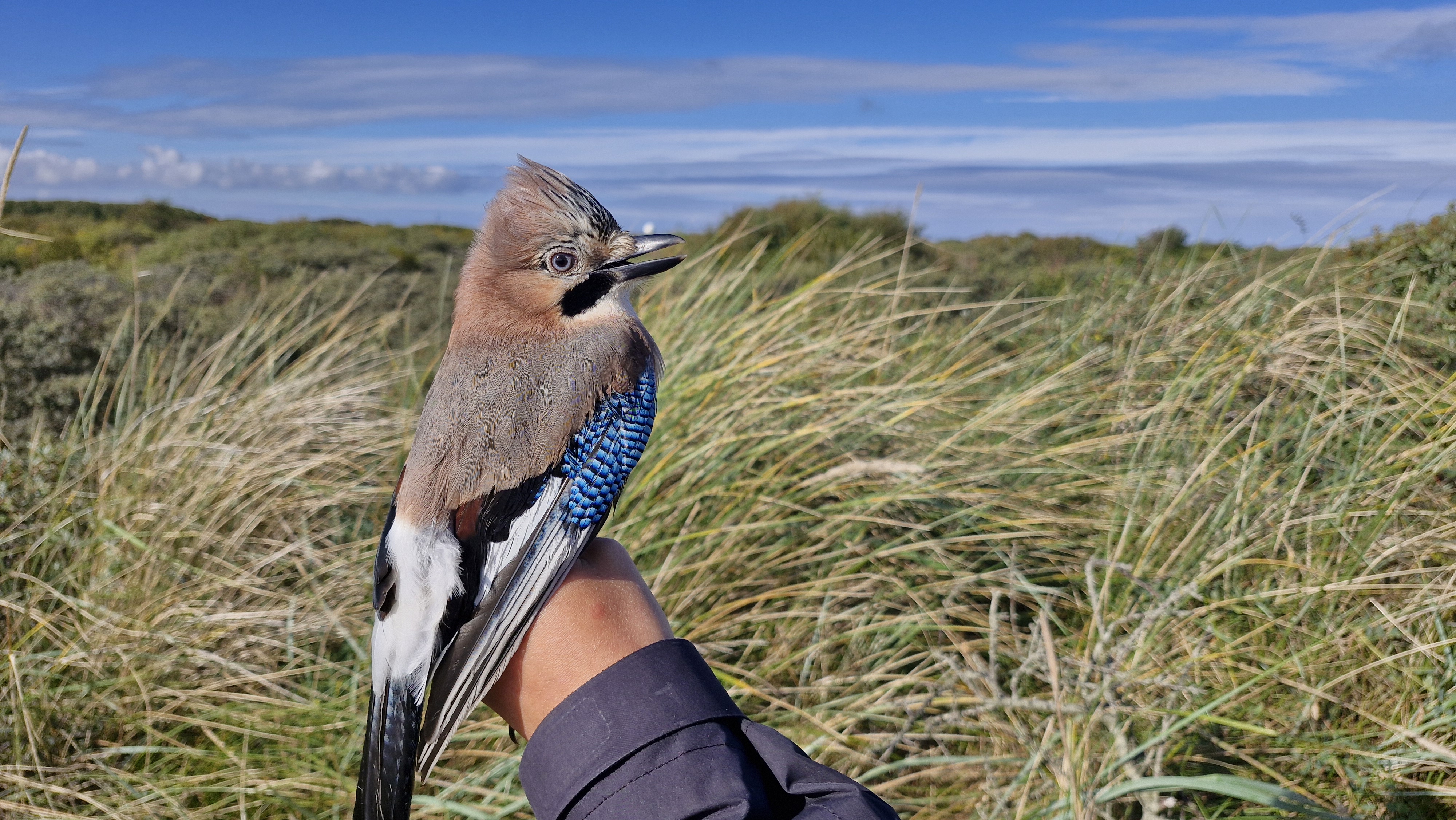
The Eurasian Jay (Skovskade) caught at Kabeltromlen.
The observers were joined by Knud this morning. After the excitement of the Rosy Starling (Rosenstær), they had a quieter second half of the observations, seeing a Great Skua (Storkjove), Red Kite (Rød Glente), and the same young Black Tern (Sortterne) that's been hanging around Grenen.
We came back home to a lunch of fried rice cooked by Augustin in an attempt to use some of the 2kg of rice Ragnar cooked last night – good job the fried rice was delicious, as we barely made a dent in our rice-stock.
In the afternoon, Augustin went to Buttervej, while I headed South of Skagen to Sandmilen. Our trips were quiet bird-wise, aside from Stonechats (Vestlig Sortstrubet Bynkefugl) and a Purple Sandpiper (Sortgrå Ryle). Meanwhile, Ragnar got on with some admin, and Mara her university assignment. Before long we had arrivals in the form of new guests and lovely Emma, a new volunteer from France who will be with us until the end of the season. We’re about to head off for an early night’s sleep, excited to see what tomorrow will bring and show Emma the ropes of observations at Skagen!
Highlights from the observations:
- Black Tern (Sortterne) 1k - 1
- Great Skua (Storkjove) - 1
- Arctic Tern (Havterne) - 5
- Rose-Coloured Starling (Rosenstær) 1k - 1, the eigth autumn record for Skagen!
Ringing (Kabeltromlen)
Vandrikse - 1
Lille Gråsiskin - 1
Tornsanger - 1
Skovskade - 1
Musvit - 1
Blåmejse - 2
Gærdesmutte - 4
Jernspurv - 1
Rødhals - 1
Gransanger - 8
Total = 21
Link to today's observations from observers in the area
People at the station: Ragnar Smith, Rosa Hicks, Augustin Sticksel, Mara Glane, Knud Peterson, Emma Fabre.
End of the first autumn week
Hej!
The day started with a very majestic sunrise as Rosa and I finished opening the nets. Ringing was slow, with a total of 19 birds. Between handling a cute Goldcrest/Fulekonge and a feisty Great Tit/Musvit and Reed Bunting/Rørspurv we had time to practice our ageing skills with Esben.
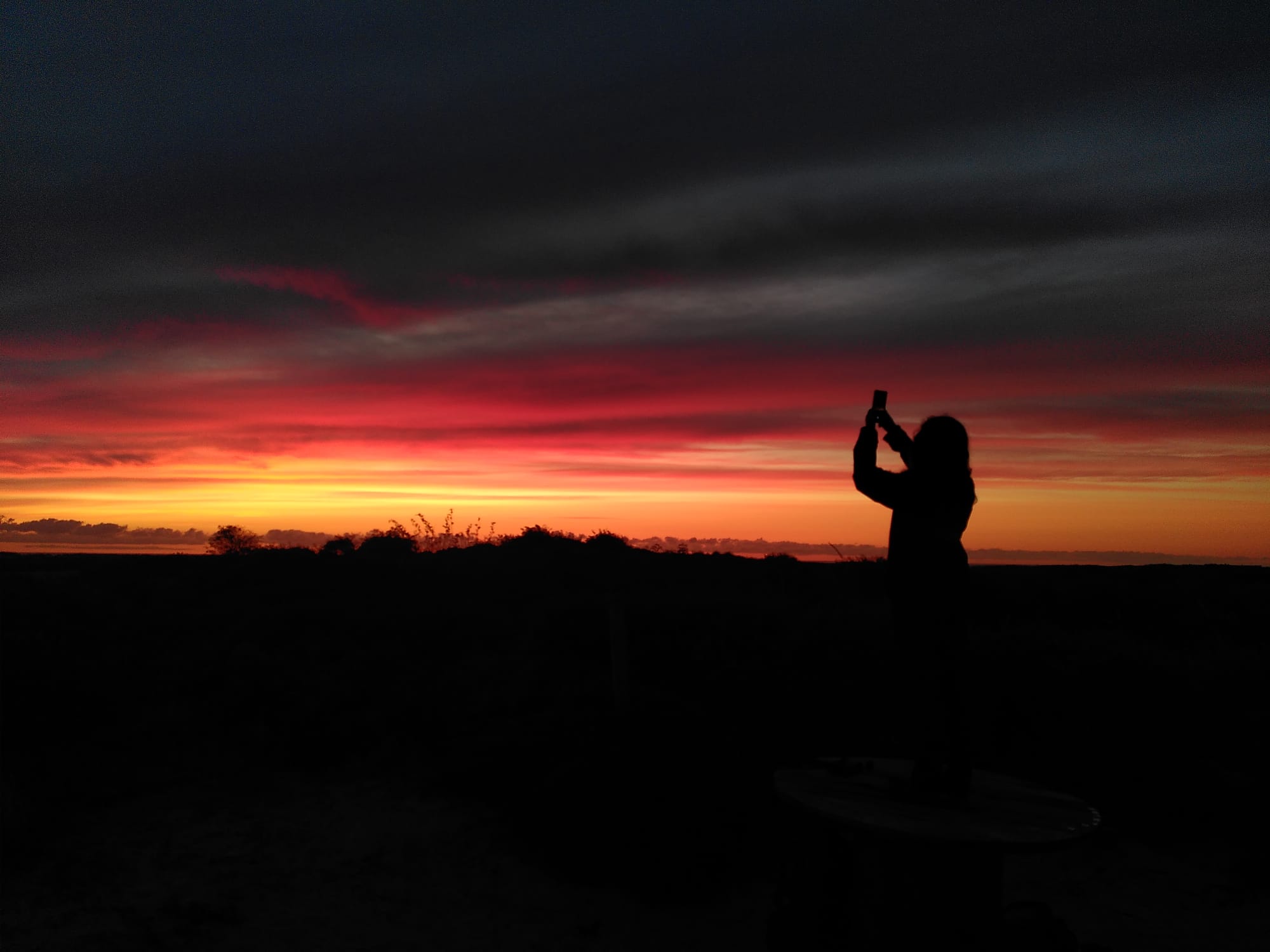
A picture worthy sunrise at Kabeltromlen
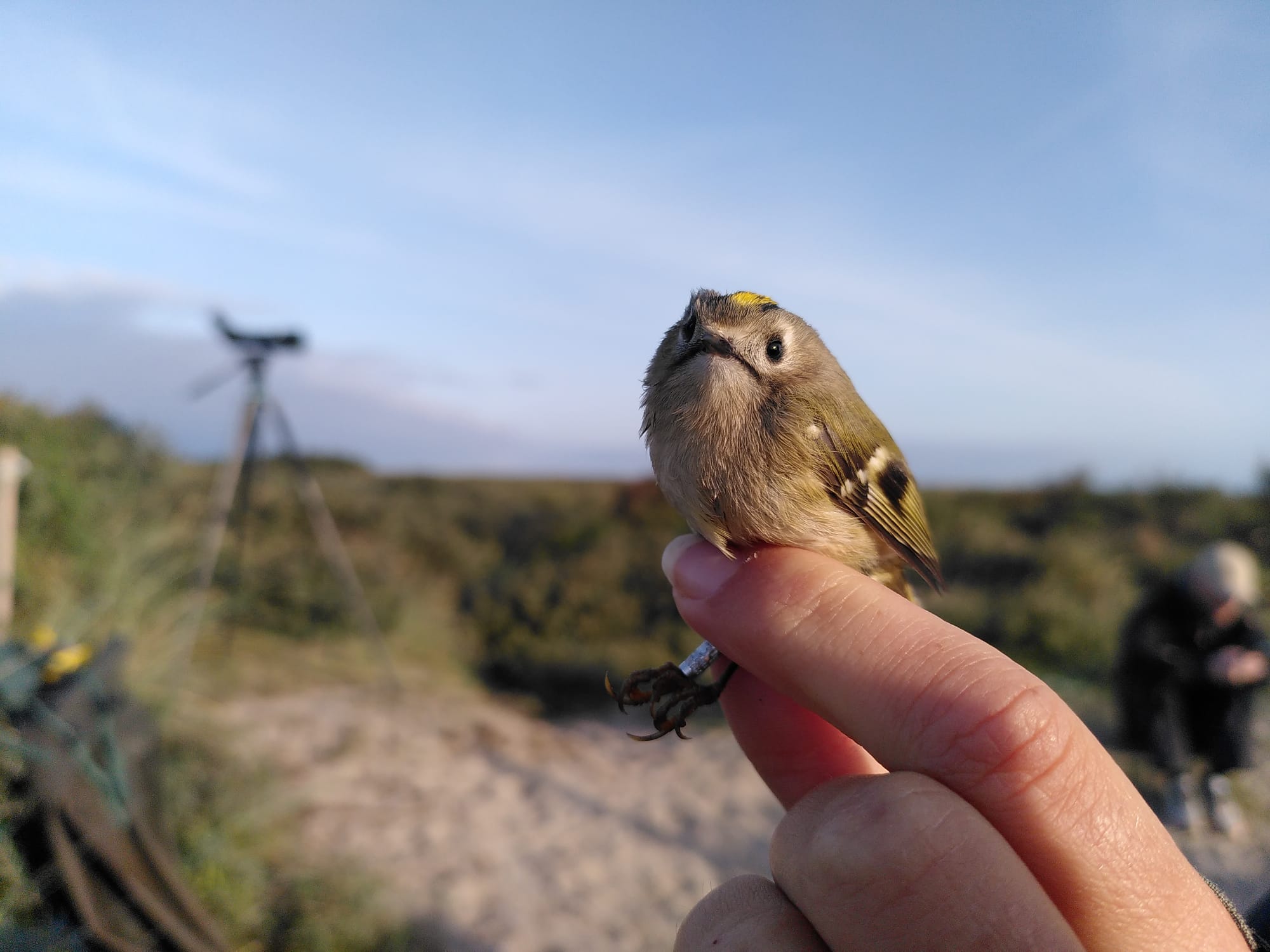
Cute madame Goldcrest
The morning with Augustin and Ragnar found a Horned Grebe/Nordisk Lappedykker at World's End 3. Also the Black Tern was still around. As a nice change the boys got bamboozled by a calling weasel that sounded like a wader.
After lunch, we said goodbye to Esben, and he and Ragnar hurried to the train station. Ragnar joined because he had to do a little trip to Hjørring. Augustin went on a long walk to Nordstrand over Skagen Vest Fyr. He spotted a Bar-tailed Godwit/Lille Kobbersneppe on the way. Rosa also went on a walk and saw a lot of Meadow Pipits/Engpiber, Jays/Skovskade, Adders/Hugorm and a friendly cow. My afternoon was much like yesterday - I stayed in to write page after page, determined to finally finish my uni assignment.
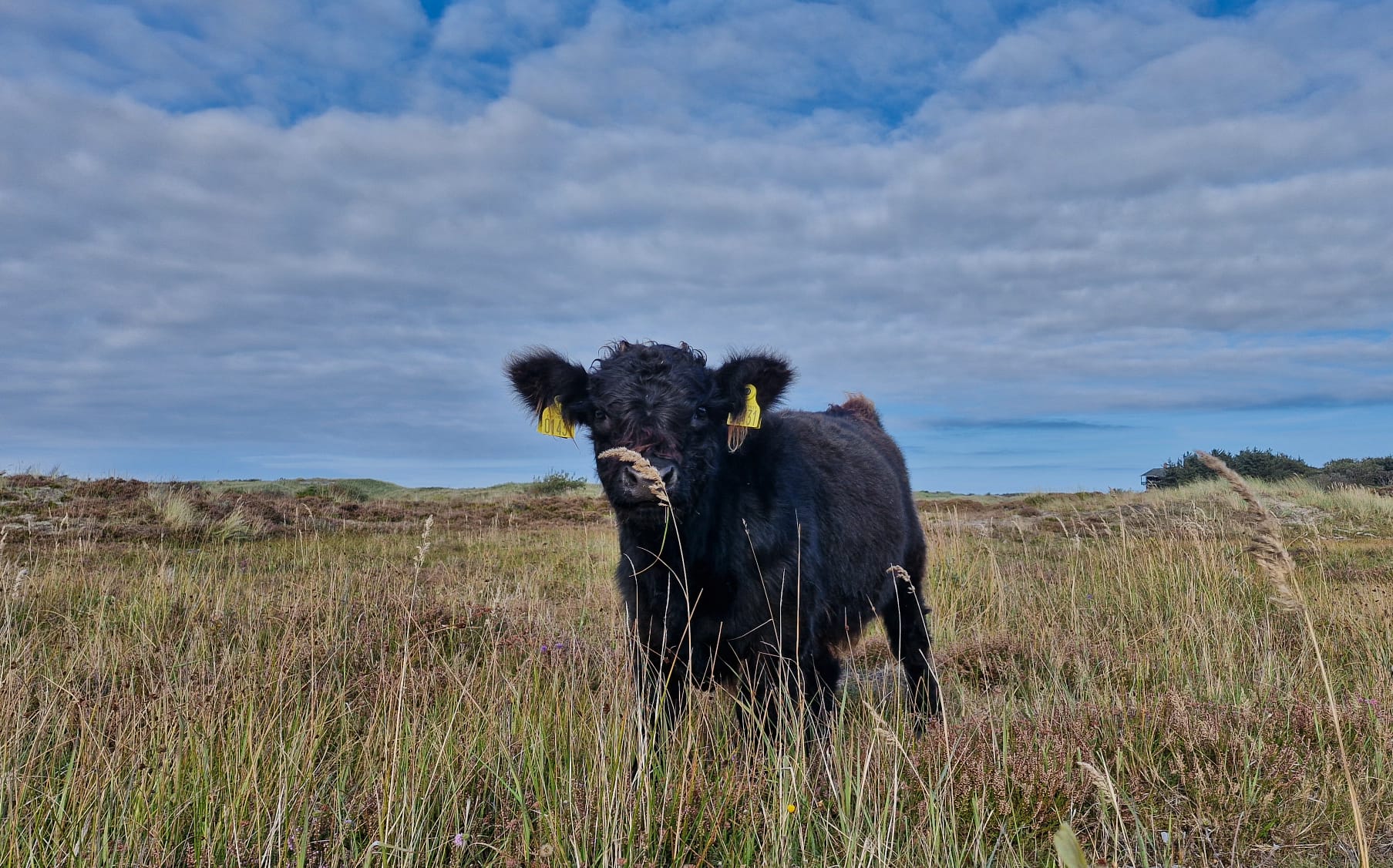
Enjoying the sun, animals and nature on a nice walk!
Highlights from the observations:
Horned Grebe/Nordisk Lappedykker - early and unusual record; last sightings in Skagen 0-2 annualy and then later in the autumn
Black Tern/Sortterne - still around
2-3 Little Gulls/Dværgmåge
Ringing (Kabeltromlen):
Musvit - 1
Gærdesmutte - 3
Jernspurv - 1
Rørsanger - 1
Rødhals - 1
Munk - 3
Tornsanger - 1
Blåmejse - 1
Rørspurv - 1
Gransanger - 5
Fuglekonge - 1
Total = 19
Link to today's observations from observers in the area
People at the station: Ragnar Smith, Rosa Hicks, Augustin Sticksel, Mara Glane, Esben Hansen.
Average Autumn Day
Today started as every other day with the ringers going to Kabeltromlen and the observers going out to Worlds End 3. Already on the way I heard what sounded like the call of a Yellow-browed Warbler (Hvidbrynet Løvsanger), but it only called once, so we will never know. Out at Worlds End 3 we could hear all the pipits calling, so Augustin kept an eye on the sea and I looked up. It was quite nice to see the migration slowly getting kicked into gear, with dozens of meadow pipits (Engpiber) trying to migrate along with small numbers of other passerines. Though nothing too crazy was seen, we still had a Black Tern (Sortterne) out fishing amongst all the gulls and six Mediterranean Gulls (Sorthovedet Måge).
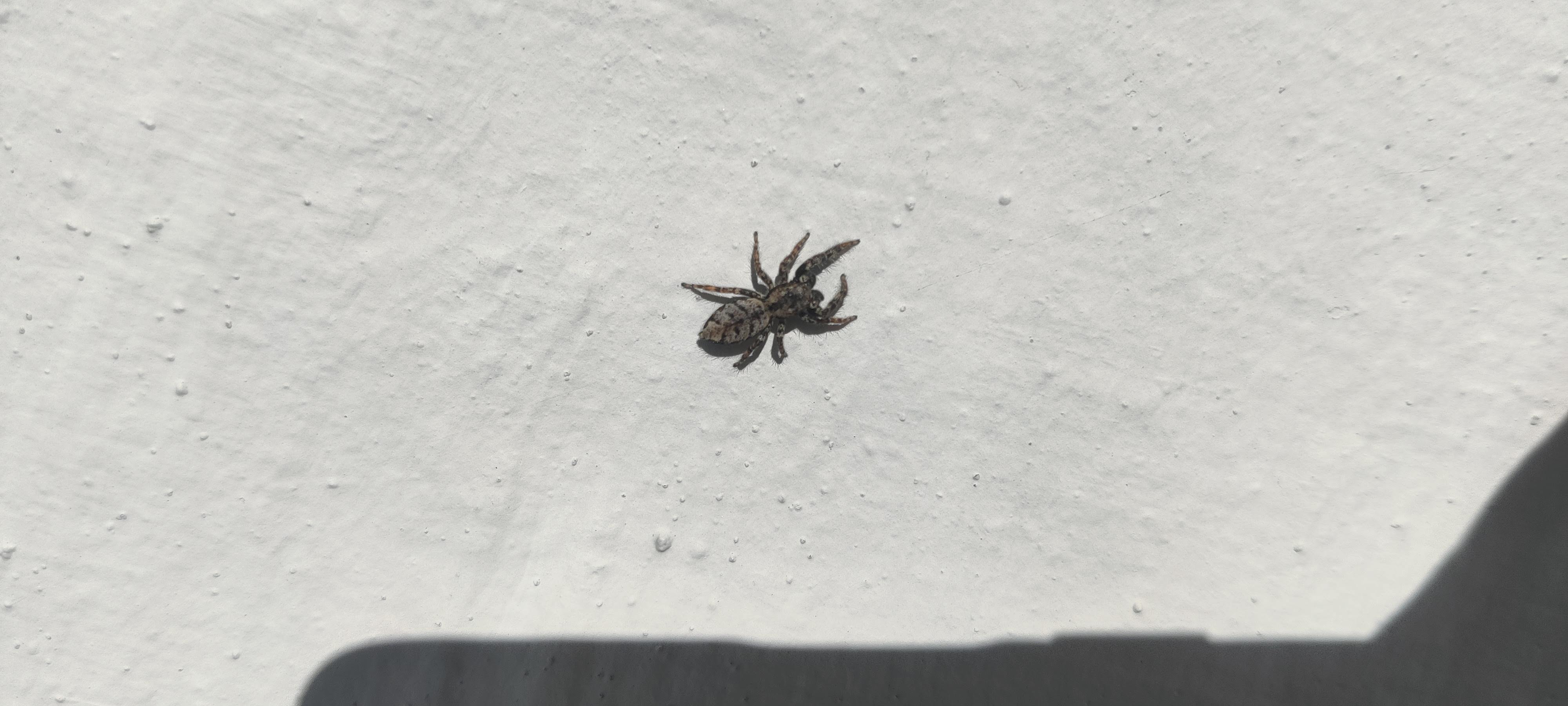 Fencepost Jumping Spider - Stor Springedderkop enjoying the sun at the lab
Fencepost Jumping Spider - Stor Springedderkop enjoying the sun at the lab
The ringers weren’t as busy as us, but managed to catch a Treecreeper (Træløber), a nice bird up here. They were also joined by two young children (aged 6 & 3). It is always a privilege to show birds to children in ringing demonstrations and hopefully inspire the next generation of bird enthusiasts.
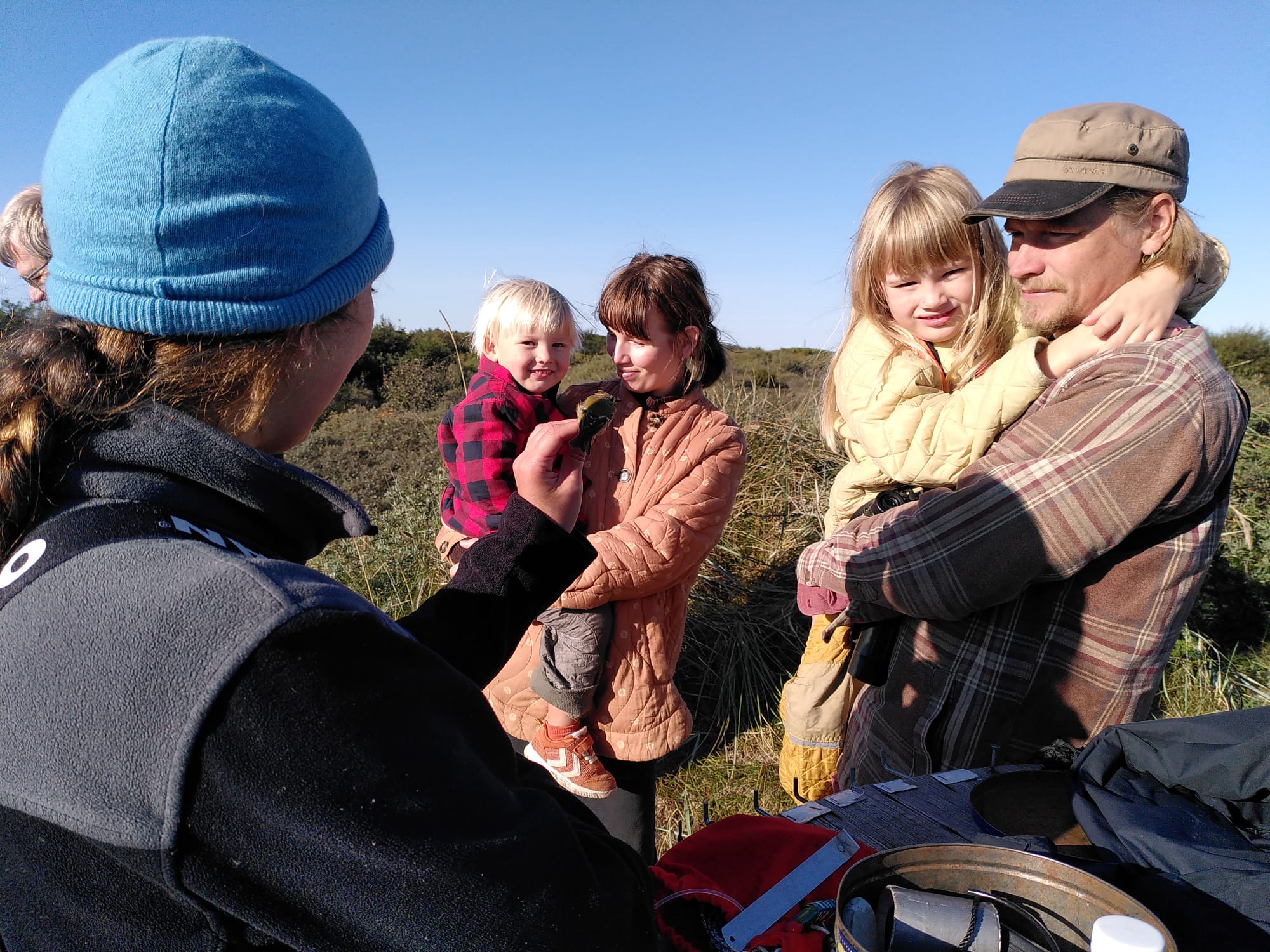
Our small guests captivated by an even smaller Goldcrest (Fuglekonge).
When we were all done, we went back to lighthouse and started cleaning as it was sanitation Saturday aka cleaning day. When we were done, we all went out, while Mara and Esben stayed at the lighthouse. I went to World End 1 and 3 to check all the gulls and terns, in the hope of a Sabine’s Gull (Sabinemåge) would turn up, but no dice, though there were some rock pipits, which was nice. Rosa caught an Adder (Hugorm) and recorded a tree, while Augustin got lost in Nedermose. When we all came back, dinner was ready, which was eaten with great gusto. Now we are all tired and are going to bed, autumn has started and its only going to be better from now on.
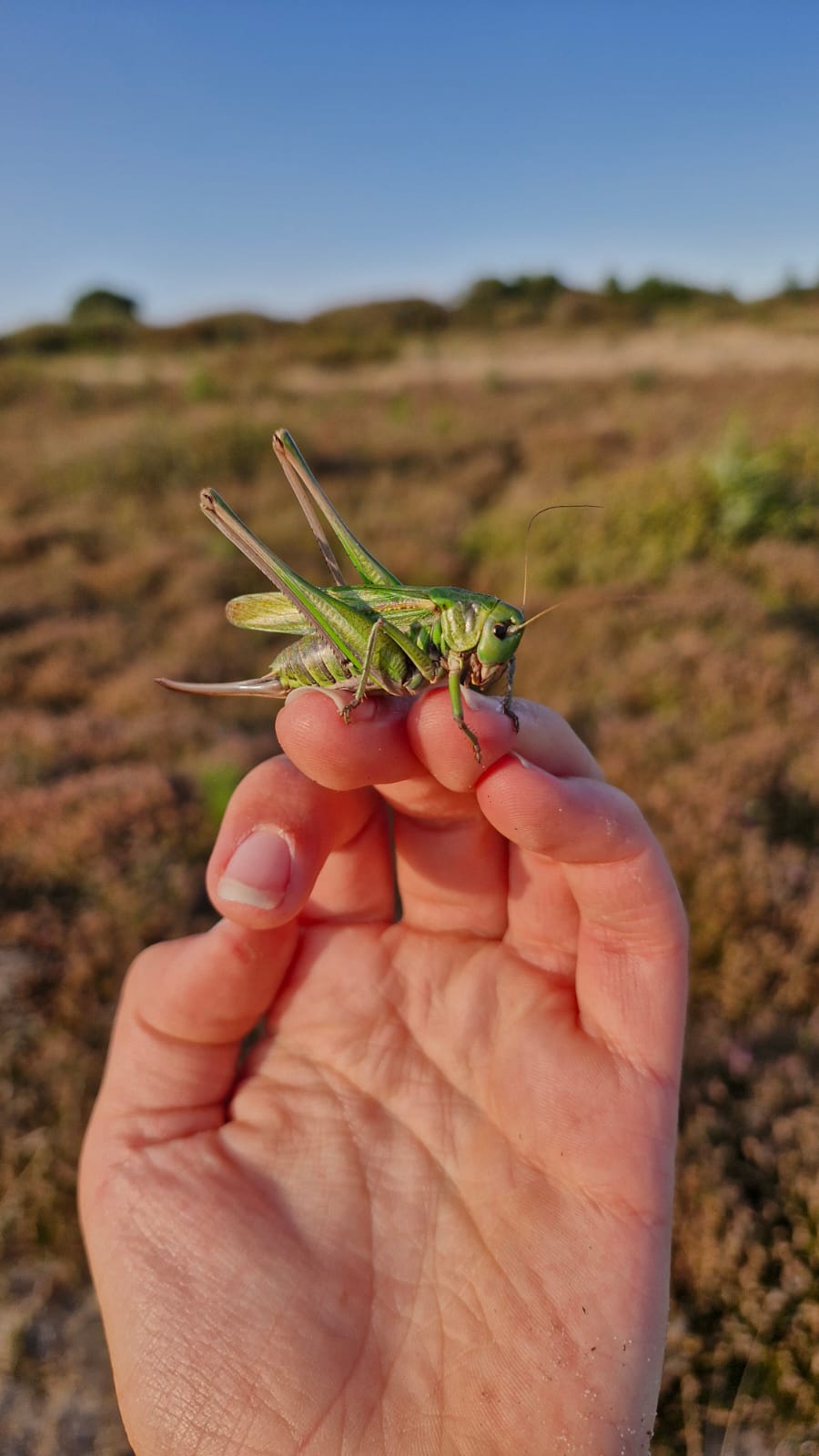 Wart-biter - Vortebider, one of the largest grasshoppers in Denmark, if there is no birds in the air, you look down
Wart-biter - Vortebider, one of the largest grasshoppers in Denmark, if there is no birds in the air, you look down
Ringing (Kabeltromlen):
Rørsanger - Reed Warbler: 1
Rødhals - European Robin: 2
Jernspurv - Dunnock: 1
Gransanger - Chiffchaff: 1
Fuglekonge - Goldcrest: 1
Gærdesmutte - Eurasian Wren: 2
Træløber - Treecreeper: 1
Total: 9
Highlights from obs:
Sortterne - Black Tern 1, scarce species in Skagen
Sorthovedet Måge - Mediterranean Gull 6, high count for Skagen
Link to today's observations from observers in the area
People at the station: Ragnar Smith, Rosa Hicks, Augustin Sticksel, Mara Glane, Esben Hansen, Mads Hagen, Helge and Inga.
Autumn has arrived!
Today I went out with Ragnar to Worlds End 3 for our observations. We saw a Spottet Redshank (Sortklire), a young Black Tern (Sortterne) along with some Caspian Gulls (Kaspisk Måge) and mediterranean Gull (Sorthovedt Måge). After our obervations we stayed out a bit longer and met a birdwatcher from america called ScottRosa and Mara went out to Kabeltromlen to open the nets, they had abit of a slow morning. The ringed ten birds today, highlights were a Reed Bunting (Rørspurv), Water Rail (Vandrikse) and a recaptured Kinfisher (Isfugl).
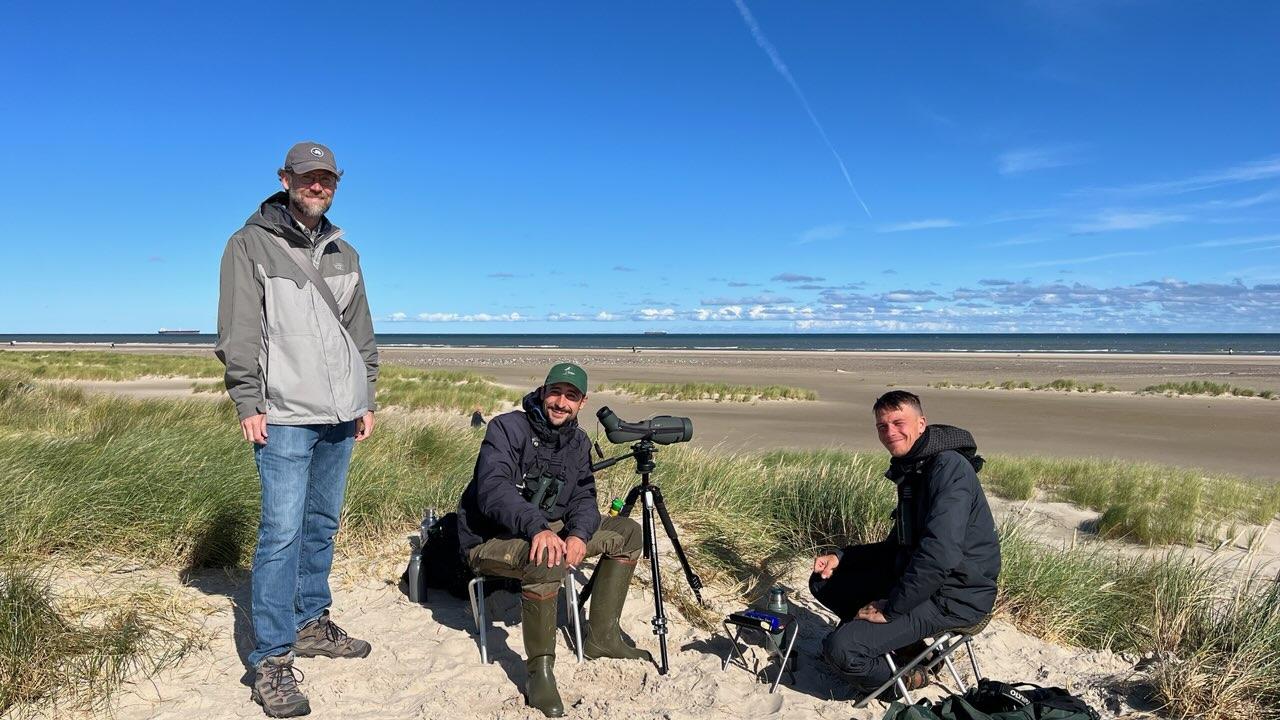
Ragnar and me in the observations wit Scott. credit: Sarah McKinney
In the afternoon I went out to go shopping with Ragnar, Mara continued working on her university assignment and Rose walked to Højen Fyr where she found a Purple Sandpiper (Sortgrå Ryle). After that Mads Hagen arrived at the station, he is going to give a talk about wildlife photography tomorrow in the lighthouse museum. Me and Rose went out to go for walks around the lighthouse where we saw a beautiful adult male Hen Harrier (Blå Kærhøg), what a stunning bird!
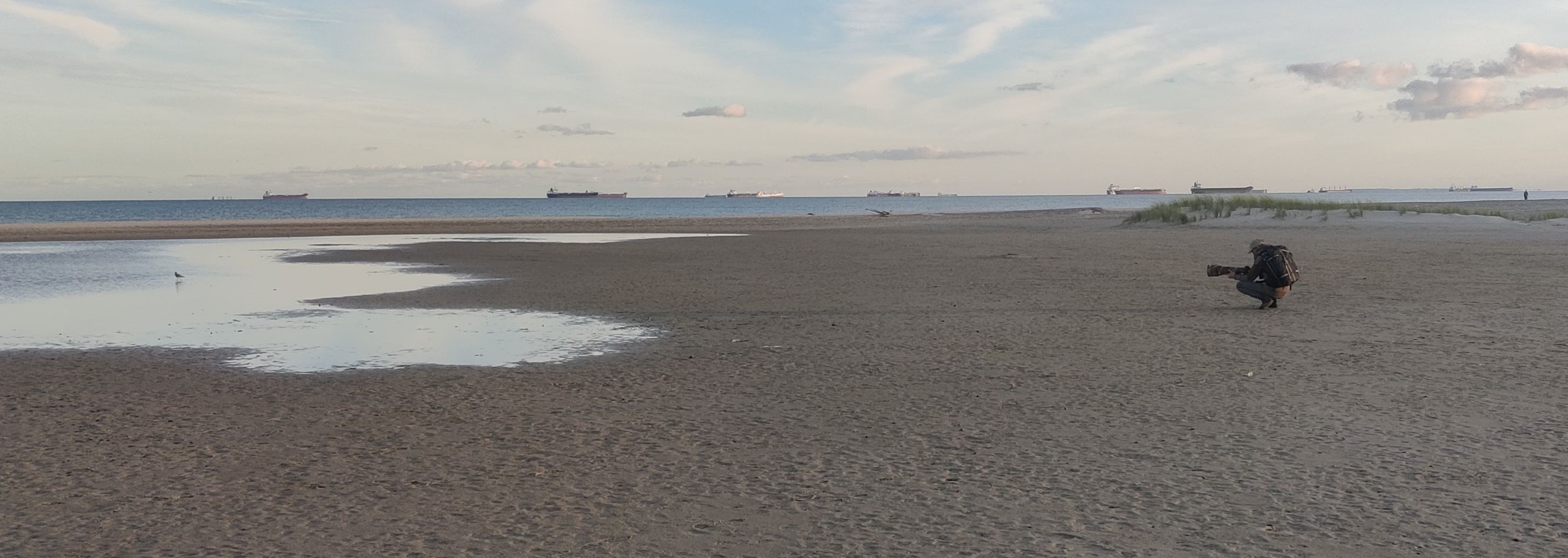
Helge takig a piture of a Golden Plover (Hjeile) on the beach
After that Ragnar found a Snow Bunting (Snespurv) at Worlds End 3 while observing Gulls on the beach. This is the second earliest record of this species in Denmark! So I rushed to the beach to see it as well, there I met up with Ragnar and Mads and we walked home for a delicious dinner Rose had prepared. Esben joined us for dinner he arrived moments earlier, he is going to say at the station until Sunday to join the ringing.
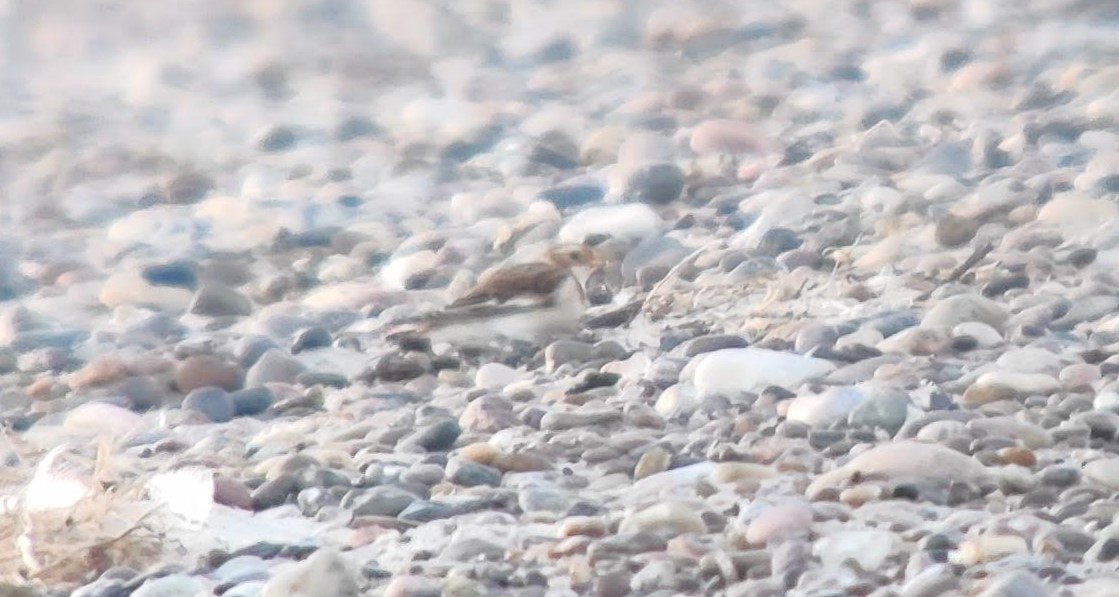
Picture of the Snow Bunting (Snespurv)
Observations of the Day:
Kaspian Gull / Kaspisk Måge -11
Snow Bunting / Snespurv – 1
Hen Harrier / Blå Kærhøg - 1
Spotted Redshank / Sortklire – 1
Black Tern / Sortterne - 1
Ringing (Kabeltromlen)
Munk – 1
Blåmejse – 1
Jernspurv – 1
Rødhals – 1
Vandrikse - 1
Rørspurv – 1
Gransanger – 4
Total = 10
Link to today's observations from observers in the area
People at the station: Ragnar Smith, Rosa Hicks, Augustin Sticksel, Mara Glane, Oluf Lou, Mette, Meds Hagen, Esben Hansen, Helge and Inga.
Rainbow day
Hej!
After a slightly rainy start to the ringing today, we were rewarded for our early rise with a beautiful rainbow and some great species, including a Water Rail/Vandrikse and a Tree Pipit/Skovpiber. Oluf, Mette and Helge joined us todaz - thanks for the help and the great company! We caught 27 birds in total and had a great chance to further develop our ageing skills with dunnocks/Jernspurv, which we seem to be catching more frequently now.
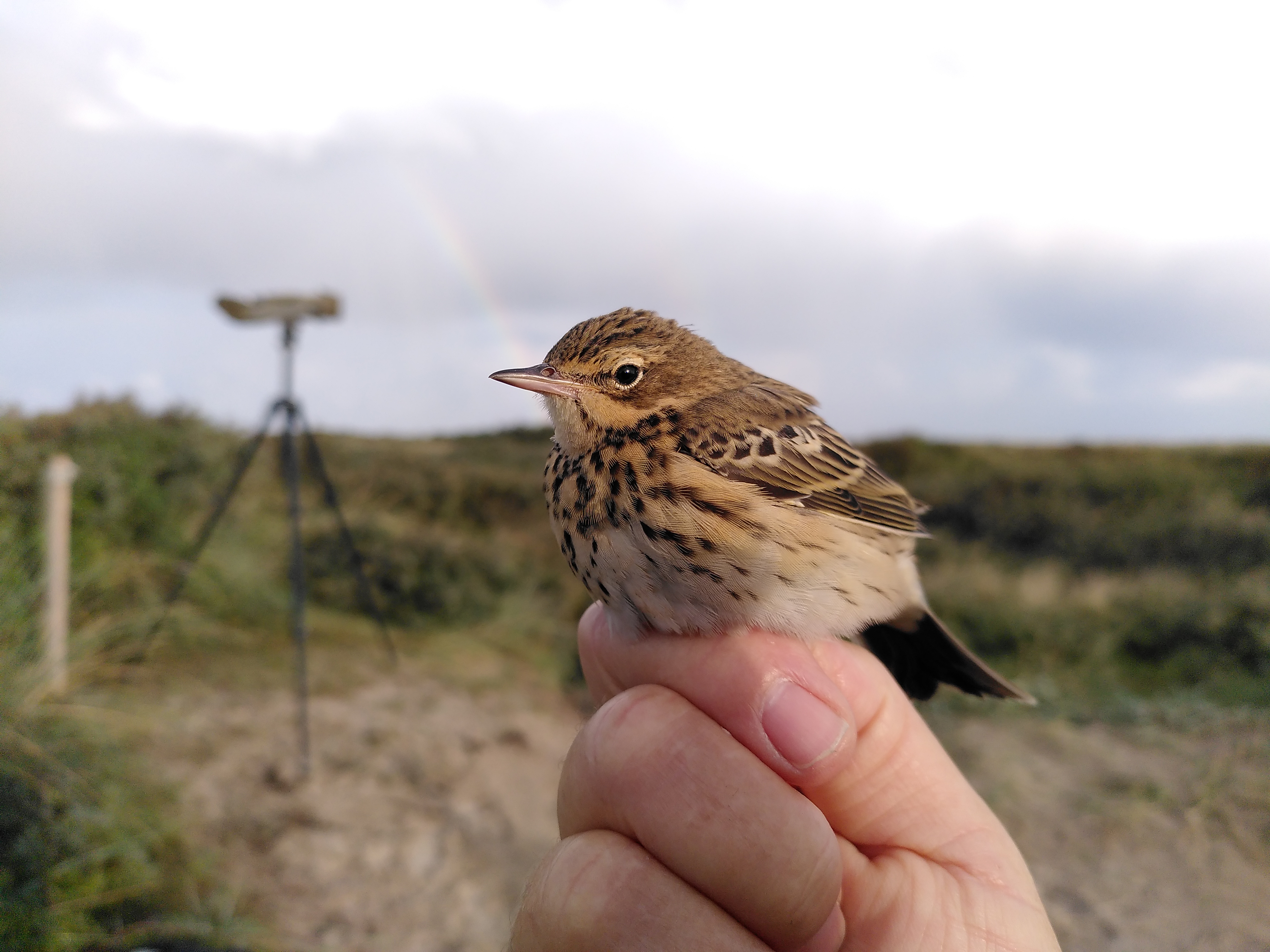
The Tree Pipit/Skovpiber in front of a faint rainbow
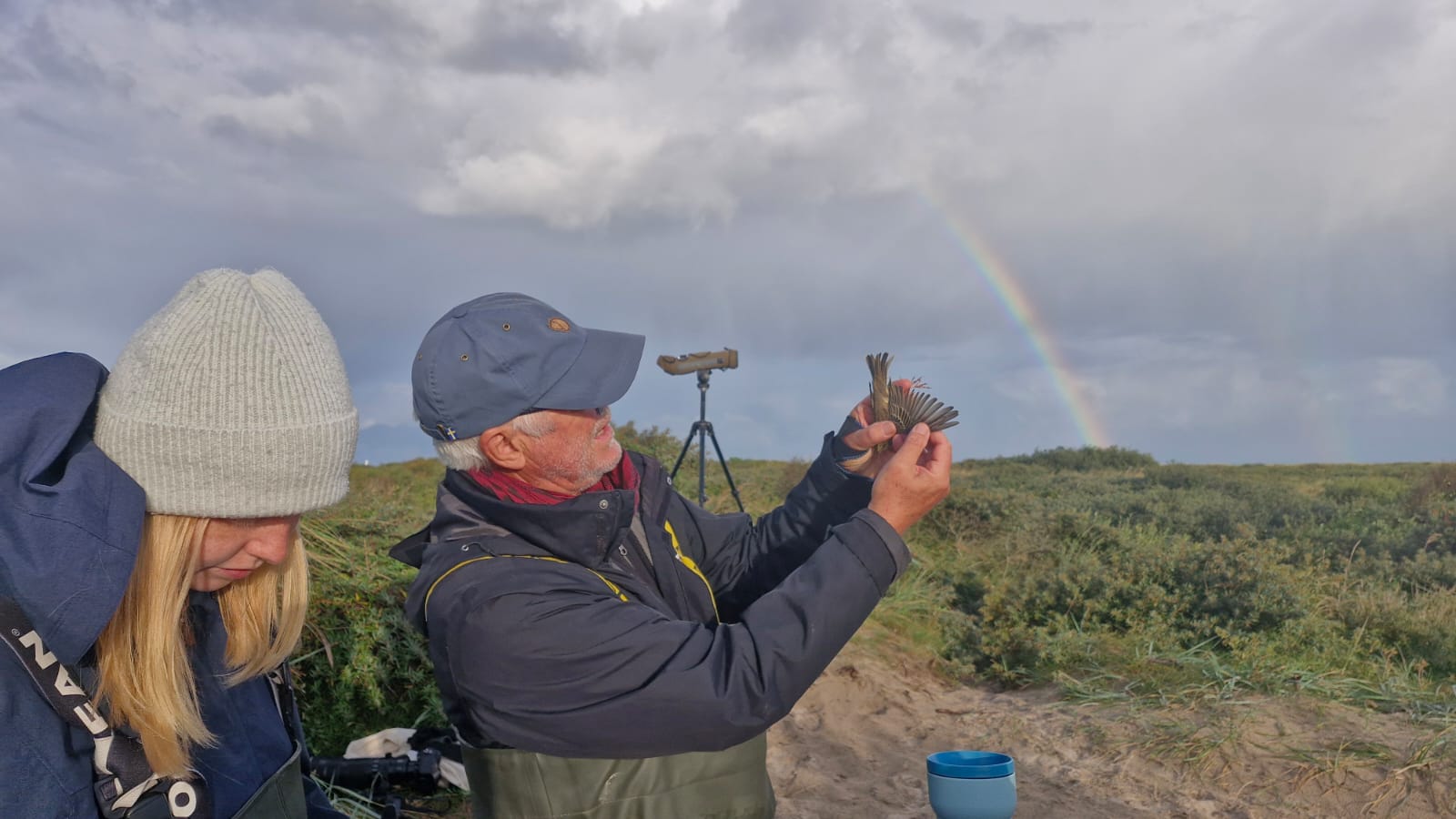
Ringing in front of a rainbow
Ragnar and Augustin, at the Observation, spottet some migrating Grey Watails, a Honey Buzzard flyig over and two Arctic Skuas. Surprises where two Swifts - quite late for the seasos- and and a first-year Yellow-legged Gull, which is the first report of this species in the area in years!
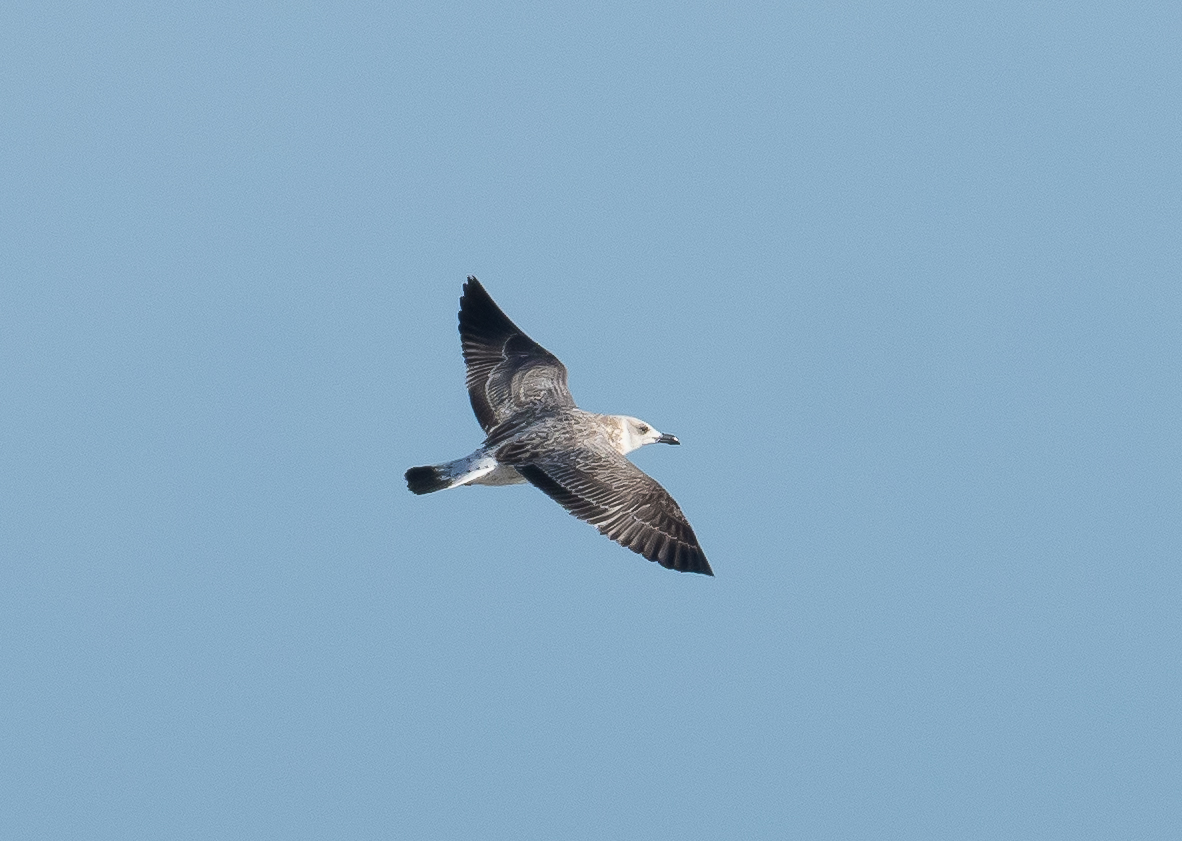
Yellow-legged gull (1k) / Middelhavs-sølvmåge
After a quick refuel of energy at the station, itwas back to birding. Ragnar spotted eight Spotted Flycatcher at Elle Krattet before meeting Augustin and Rosa for seawatching at World's End 3. While they where out, they noticed that the air was filled with Dunnock/Jernspurv calls and the sky was showing a beautiful rainbow (again). Ragnar, who went home earlier to cook us a delicius dinner, missed the sight of 40 Fulmars/Mallemuk following a fishing travler.
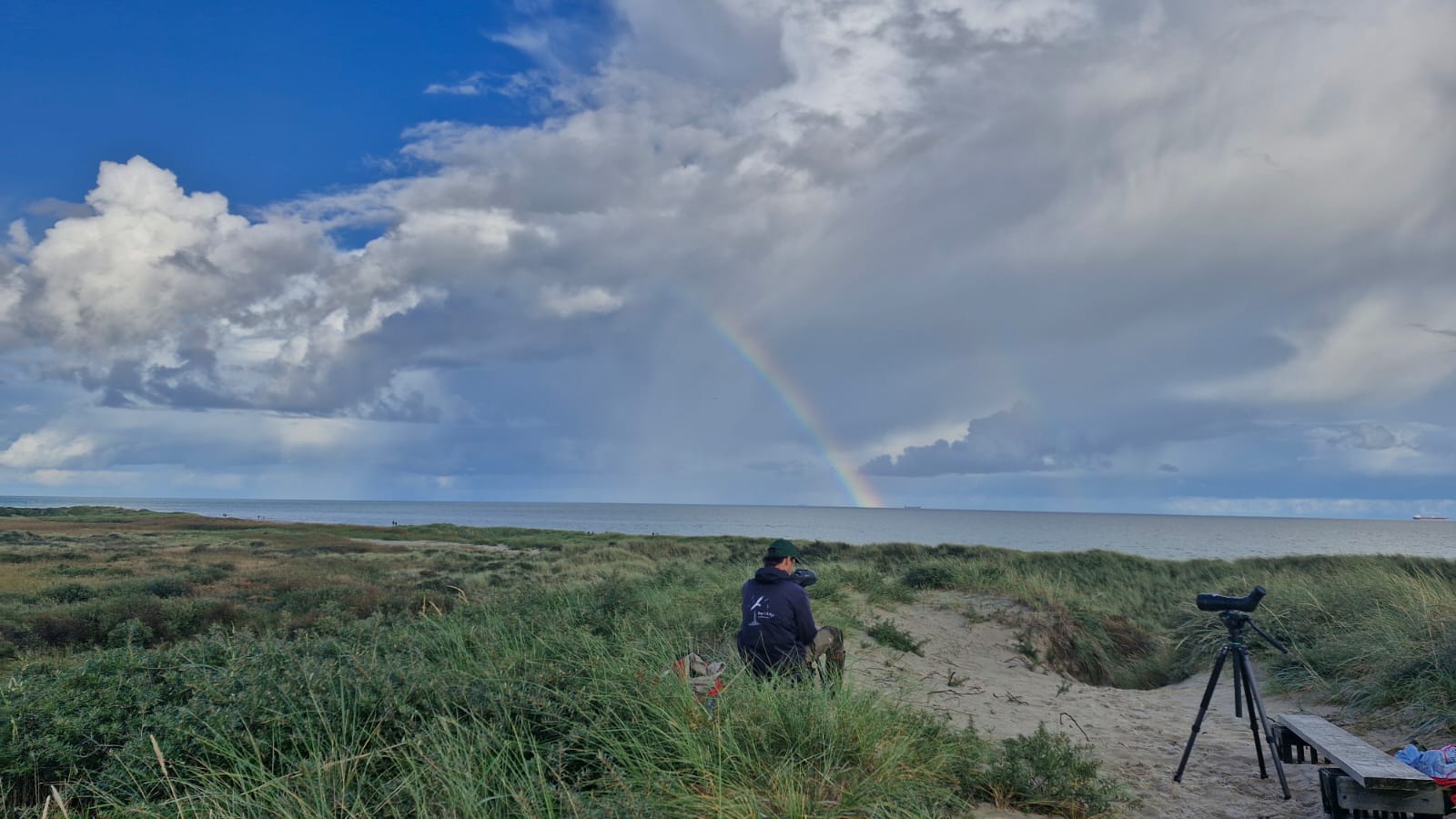
Sun + Rain = Rainbow
Hightligts from the observations:
Yellow-legged Gull / Middelhavssølvmåge - 1 1k (first record for Skagen since 2019)
Caspian Gull / Kaspisk Måge - 2 1k, 2k
Mediterranean Gull / Sorthovedet Måge - 3 1k
Arctic Skua / Almindelig Kjove- 2 1k
Honey Buzzard / Hvepsevåge - 1 1k (migration attempt for the fourth day in a row)
Ringing (Kabeltromlen):
Vandrikse - 1
Musvit - 1
Grå Fluesnapper - 1
Rødhals - 8
Løvsanger - 1
Jernspurv - 9
Munk - 5
Skovpiber - 1
Total: 27
Link to today's observations from observers in the area
People at the station: Ragnar Smith, Rosa Hicks, Augustin Sticksel, Mara Glane, Oluf Lou, Mette, Helge and Inga.
Warm Soup for a Cold Troop
Hi folks!
Autumn was well and truly here this morning so we put our thermals on and packed our flasks of coffee ready for morning observations and ringing.
Ragnar and Augustin were at World's End Three, joined by Knud and guests Helge and Inga. The team spotted 11 Fulmar (Mallemuk) and 555 Gannets (Sule). They also spotted a single Great Northern Diver (Islom) and a few Rock Pipits (Skærpiber).
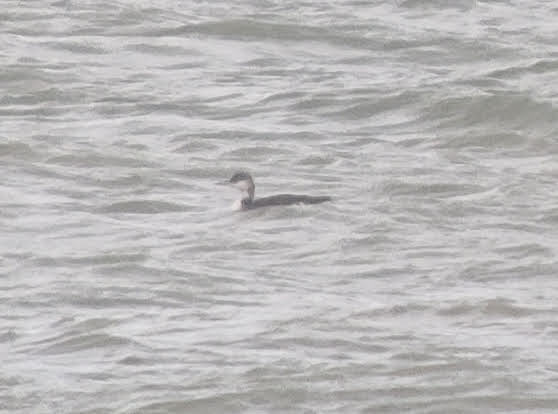
Great Northern Diver (Islom).
Meanwhile, Mara and I were joined by Oluf for the ringing. The cold weather had brought with it the first Dunnock (Jernspurv) of the season in the first net. This was followed by 7 more - so we quickly got to work trying to wrap our heads around Dunnock ageing. The session also saw 14 Blackcaps (Munk), 2 Redstarts (Rødstjert), and 1 Wren (Gærdesmutte), with 40 new birds brought in with the colder weather.
After lunch we went out on some independent galavants: Augustin went on his second trip of the day to Grenen, where he counted Sandwich Terns (Splitterne) and spotted a Sparrowhawk (Spurvehøg). Ragnar went on his second trip of his stay to the Skagen Barbers, where he looked out the window wishing he was birding.
We then got on with some admin and cleaning tasks, discovering a dead Hummingbird Hawk Moth (Duehale) in the process, quite an unusual lepidoptera species for the region. We then enjoyed a warming soup cooked by Augustin and are all looking forward to an early night.
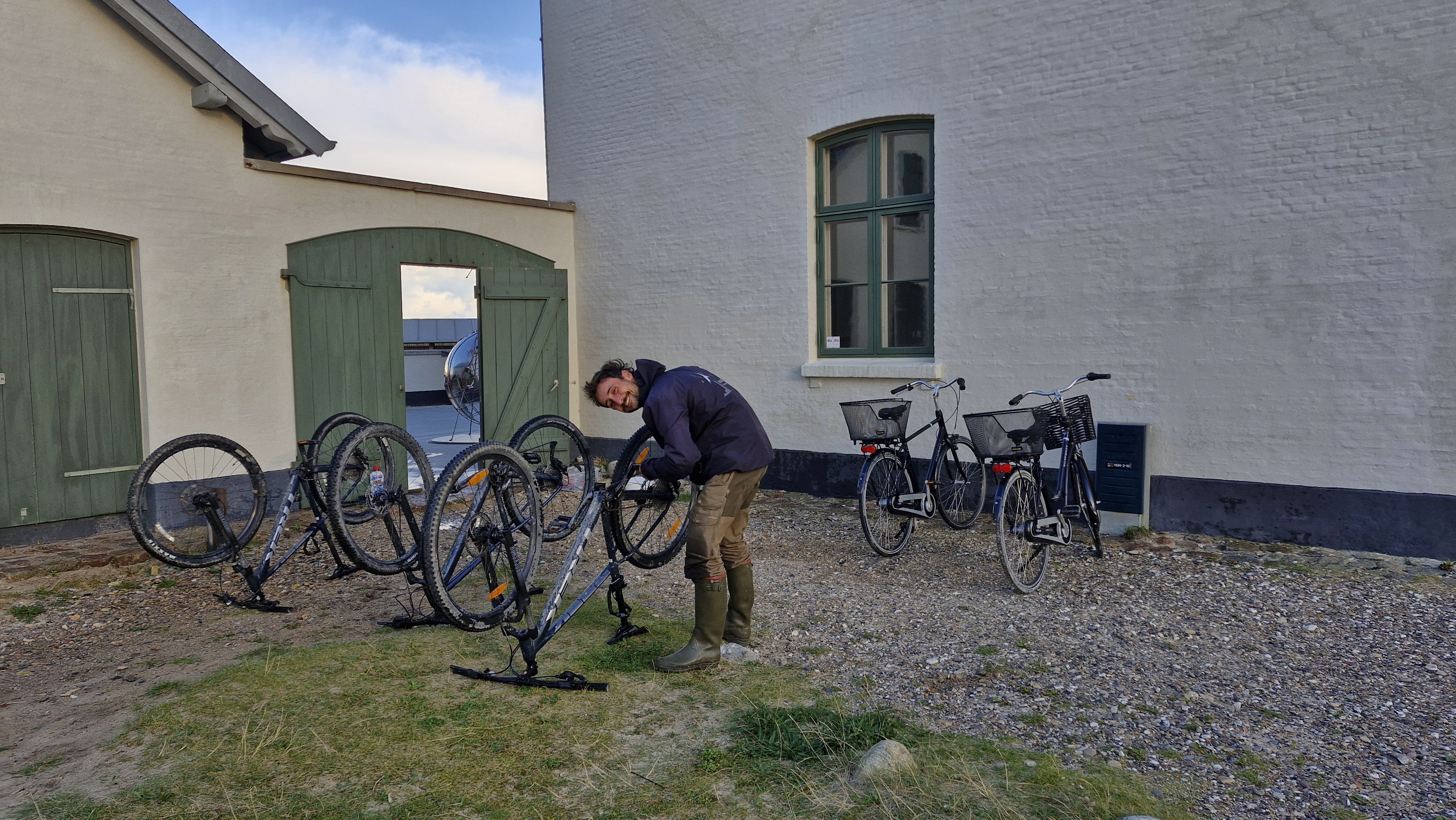

Augustin cleaning the bikes, before treating himself to a trip up the lighthouse for being such an industrious worker.
The weather tomorrow looks similar to today's, so we are looking forward to some more autumn migration action - good night!
Ringing (Kabeltromlen)
Munk - 14
Rødhals - 4
Blåmejse - 1
Rødstjert - 2
Rørsanger - 1
Gransanger - 5
Løvsanger - 3
Jernspurv - 8
Solsort - 1
Gærdesmutte - 1
Total = 40
Link to today's observations from observers in the area
People at the station: Ragnar Smith, Rosa Hicks, Augustin Sticksel, Mara Glane, Helge, Inga, Oluf Lou.
If you wanna learn more about the current volunteers, or previous volunteers, then you can learn more about them here!
